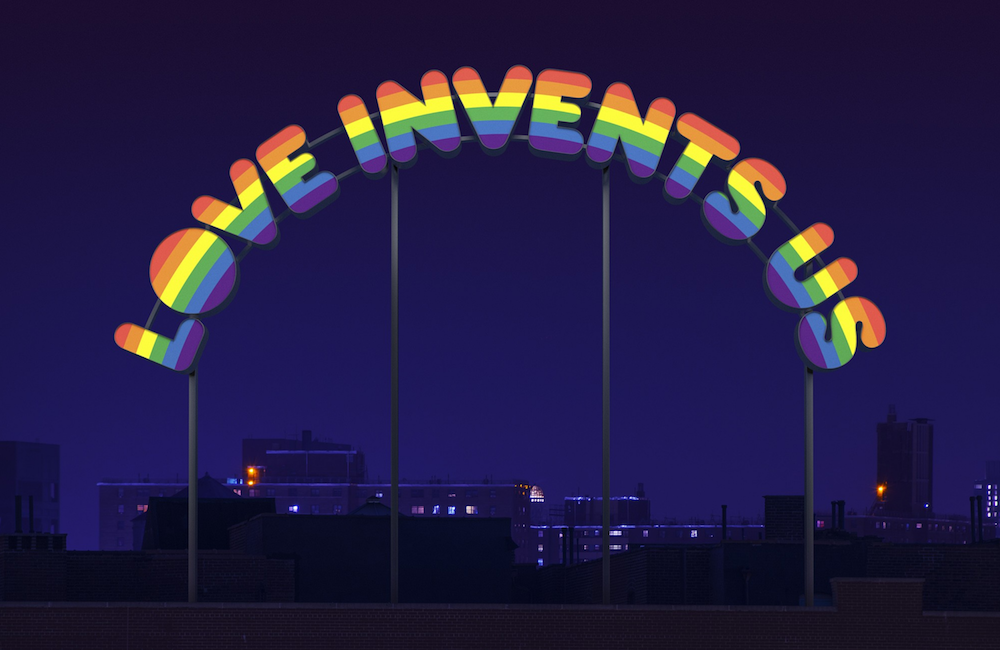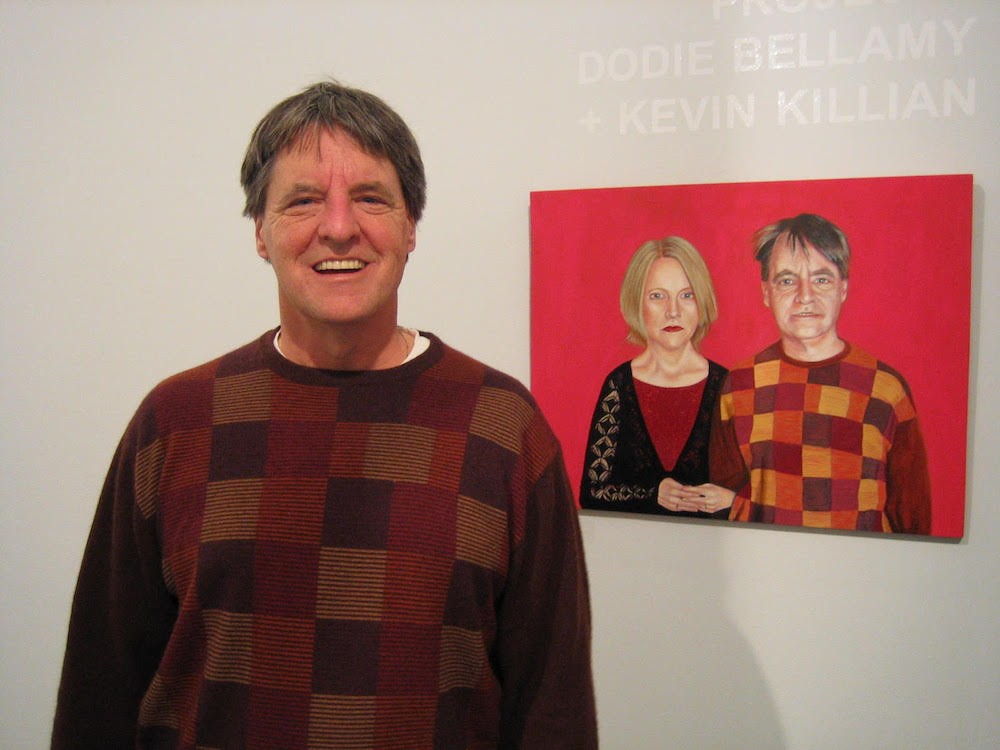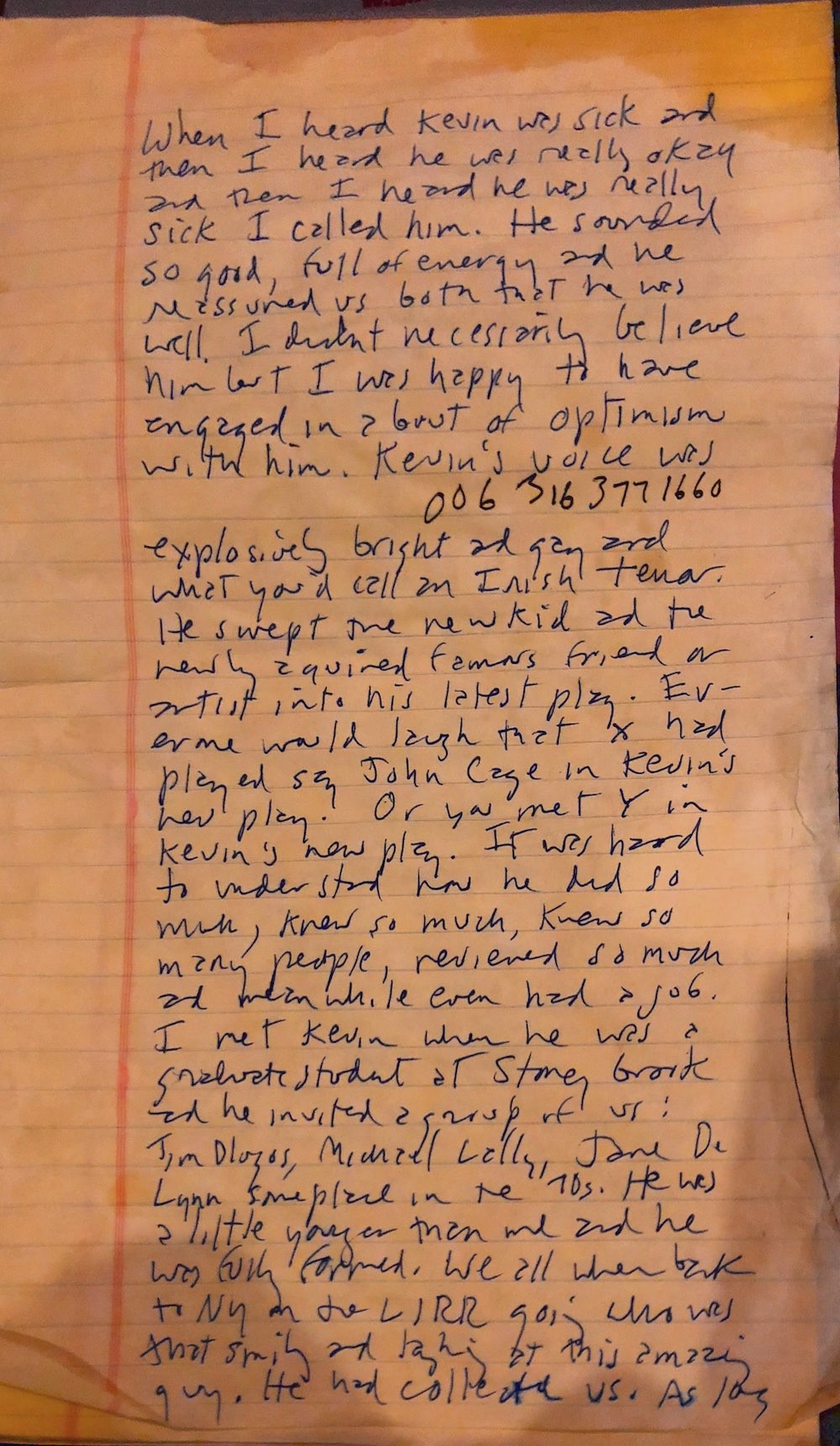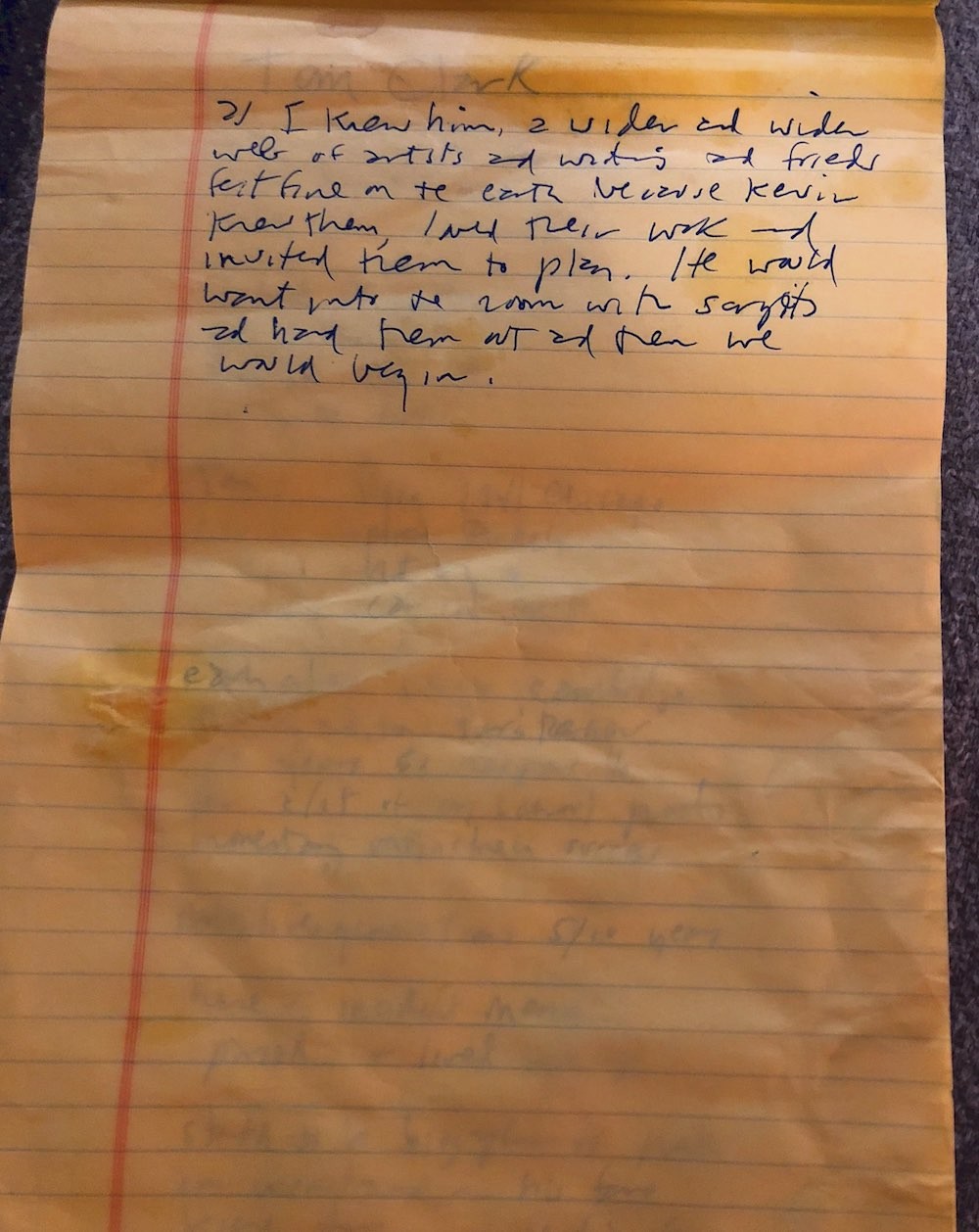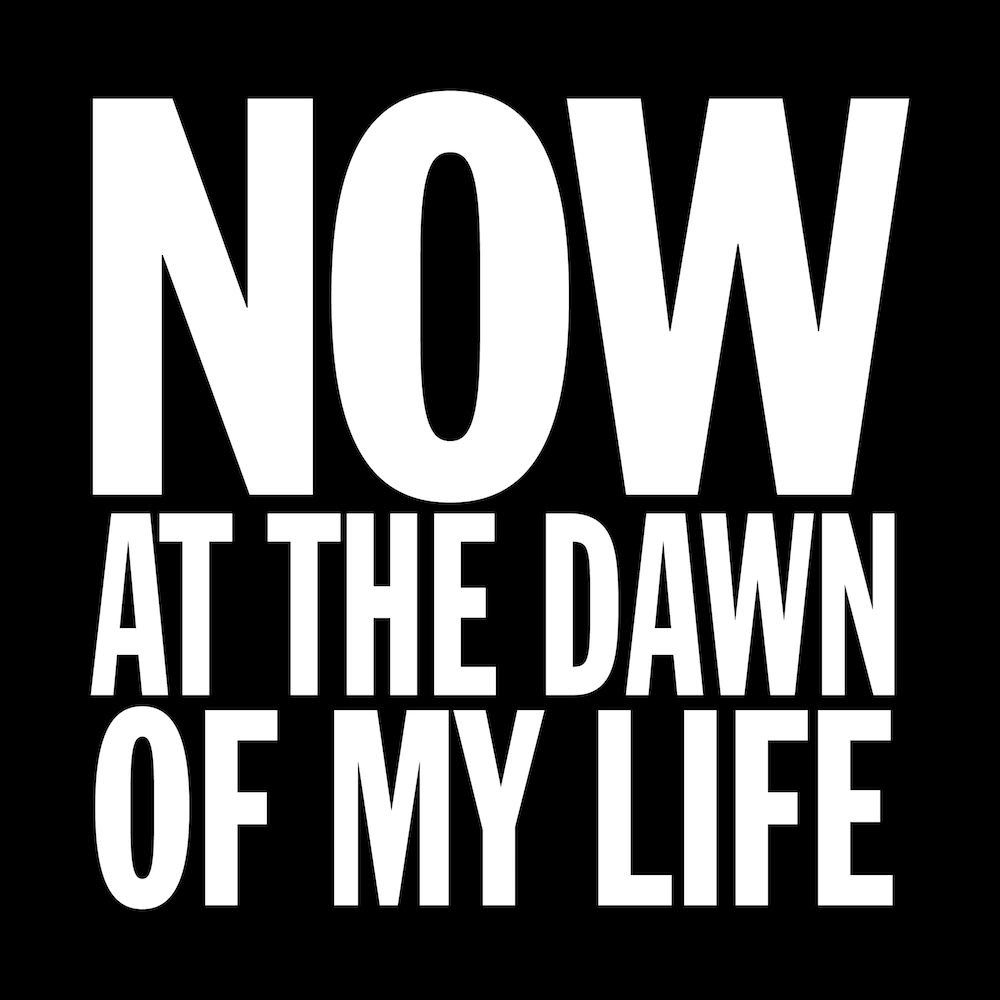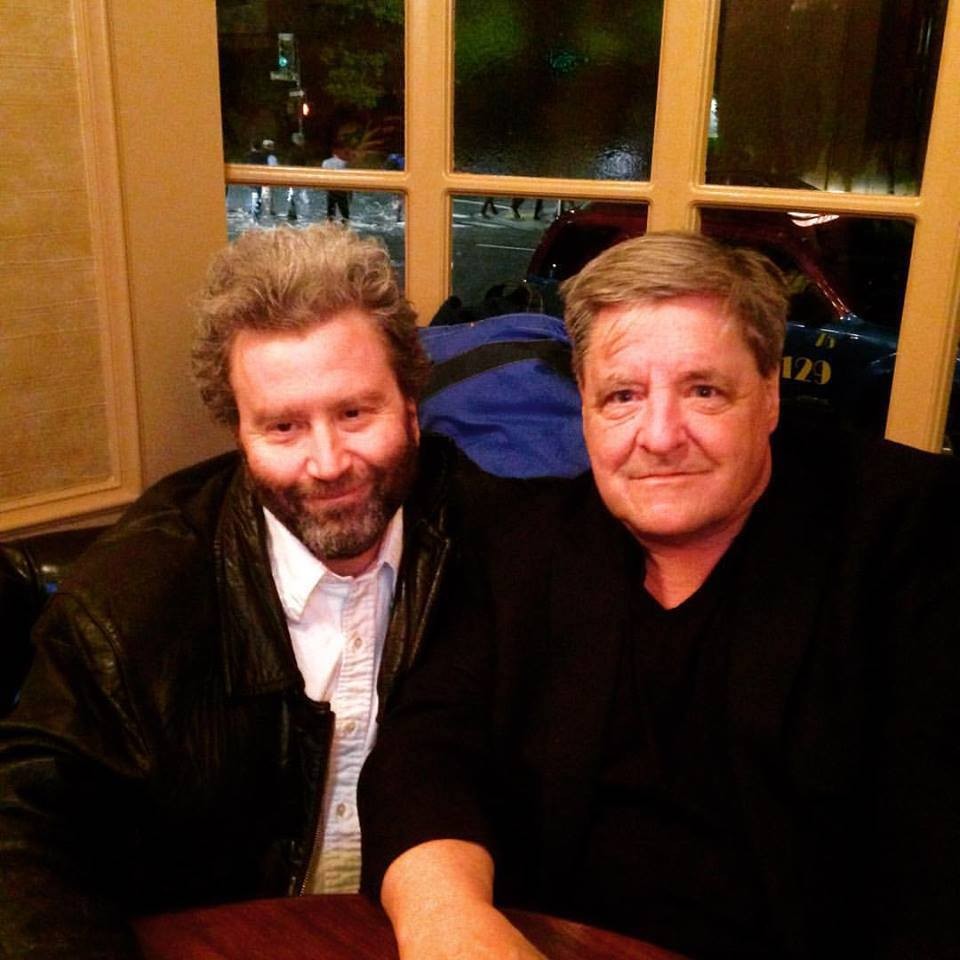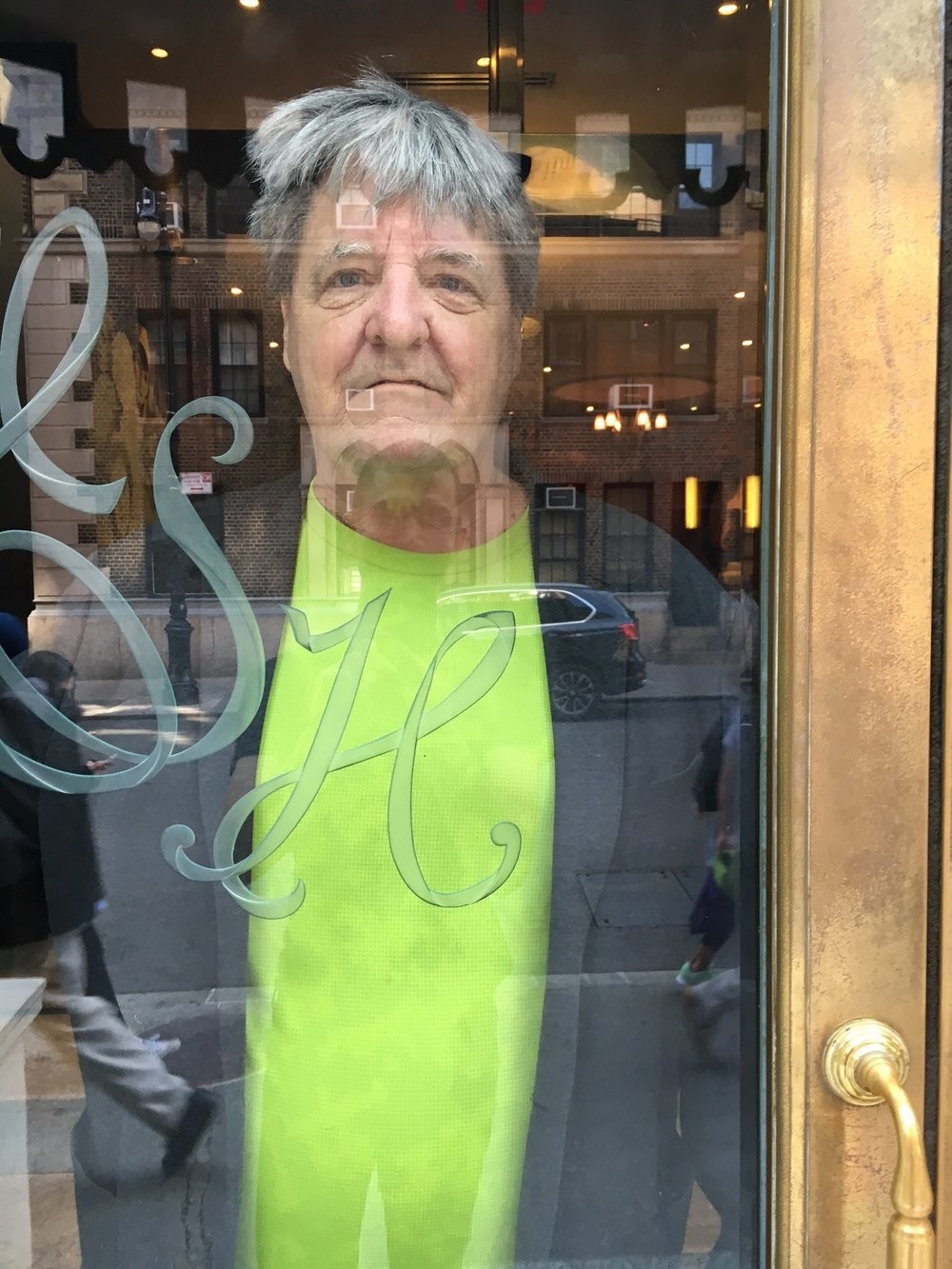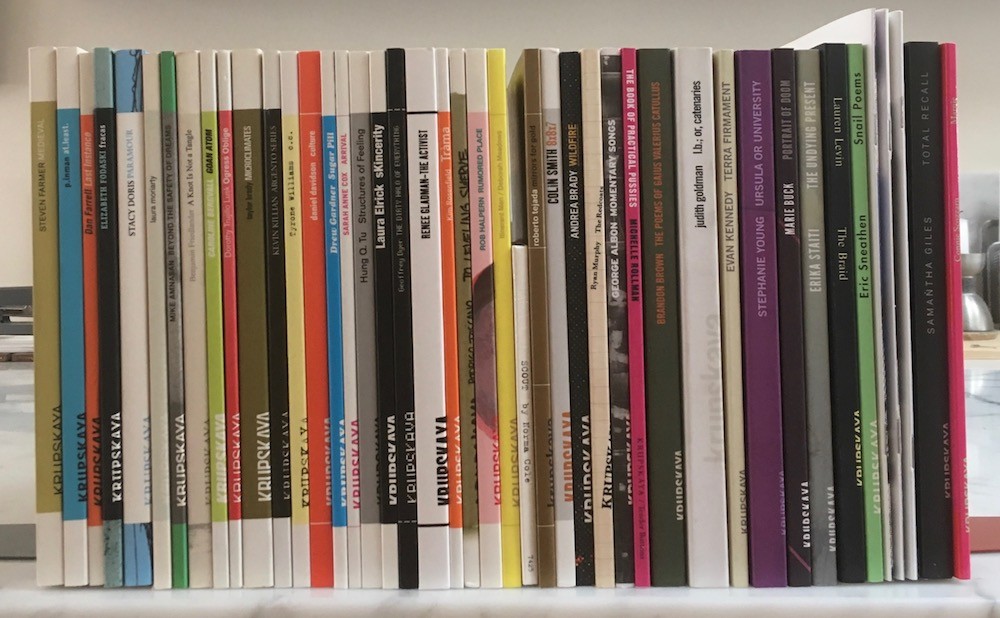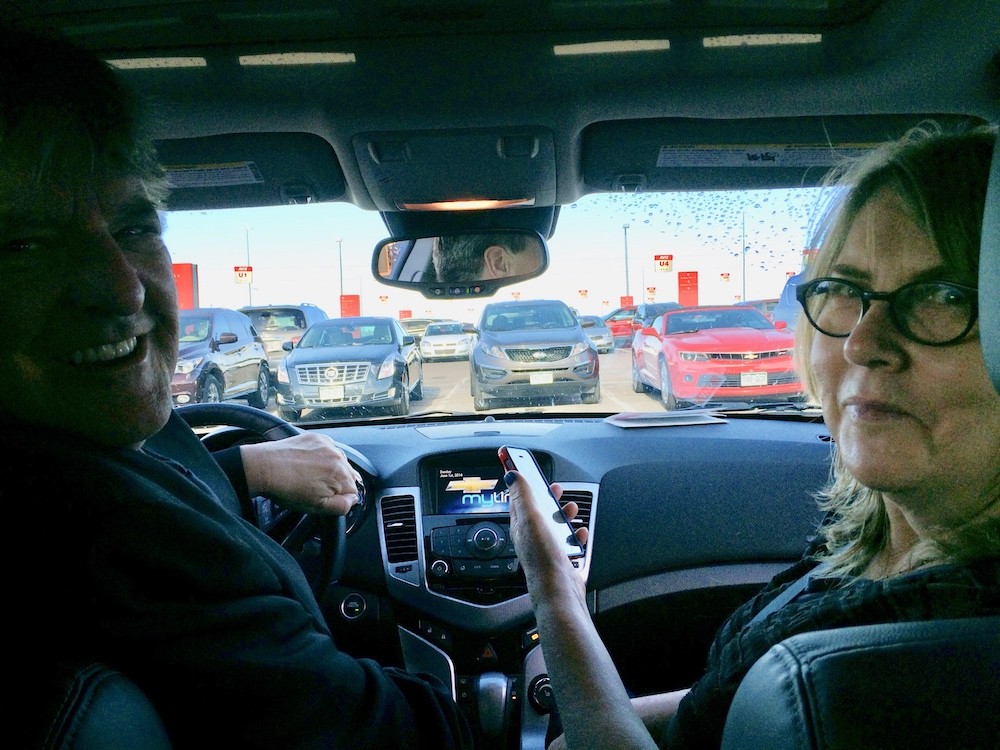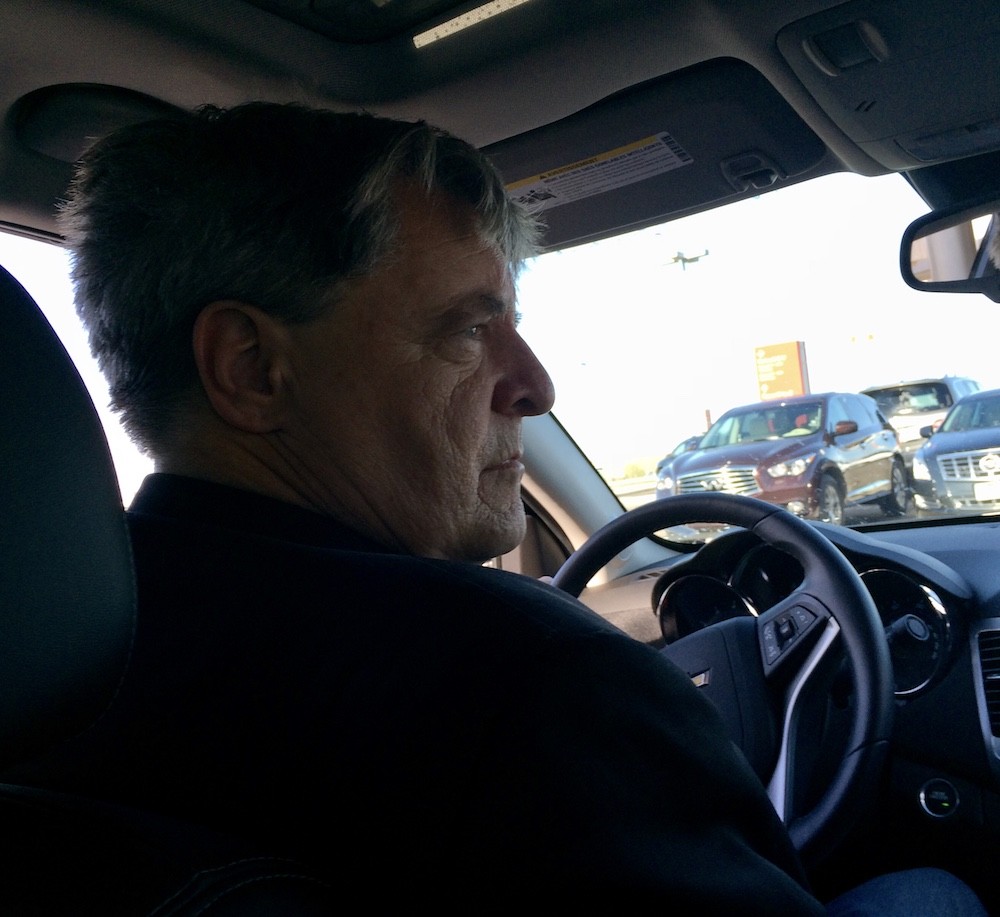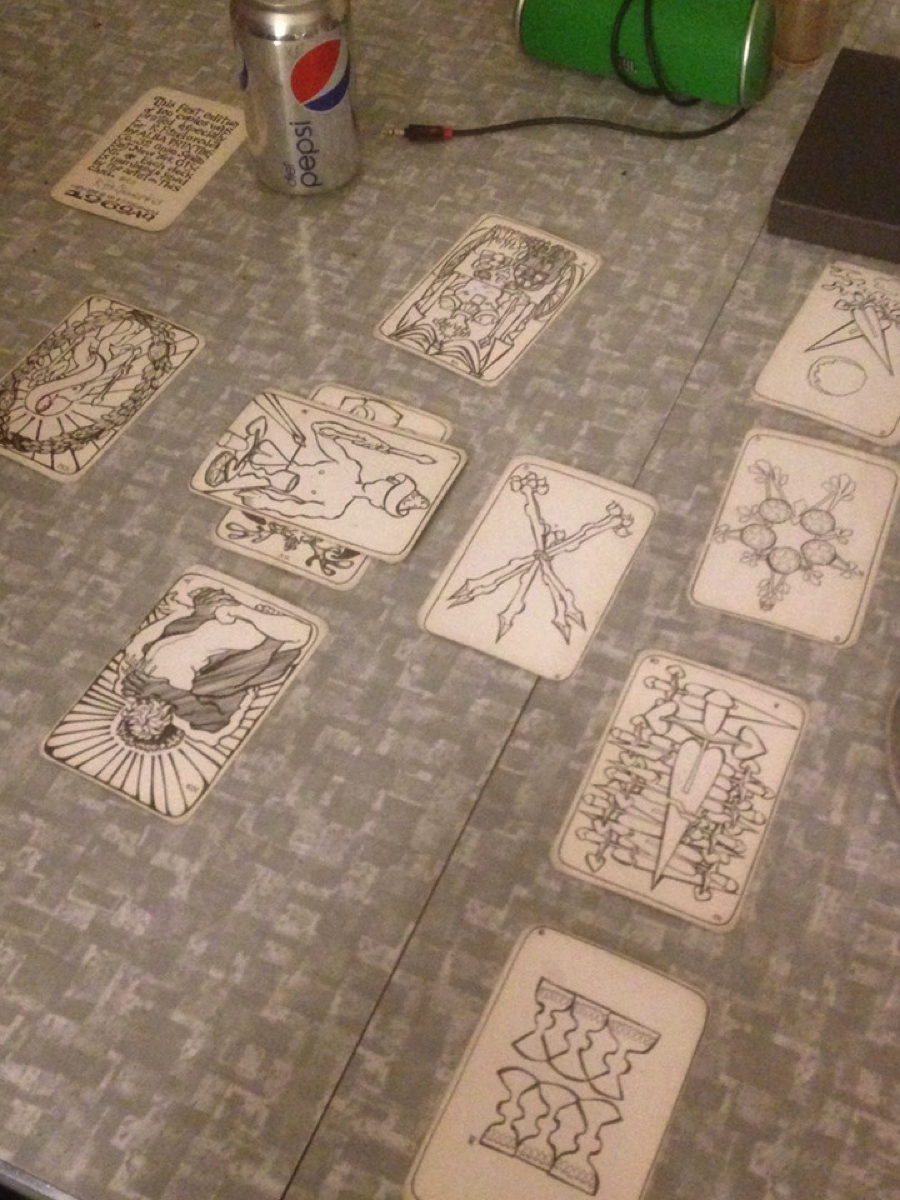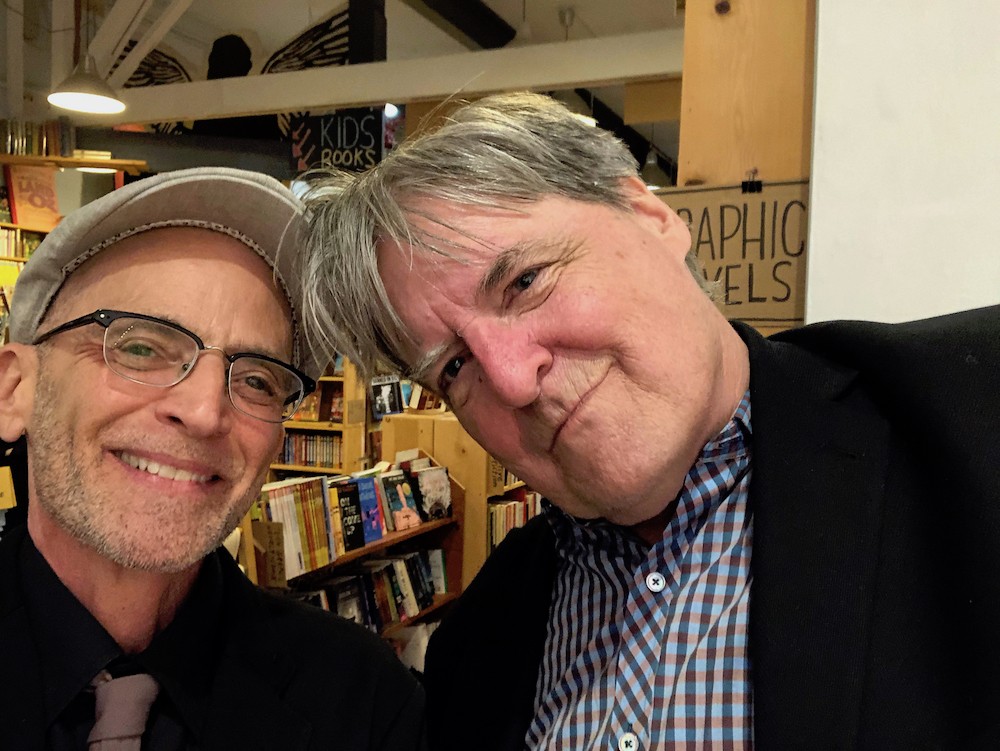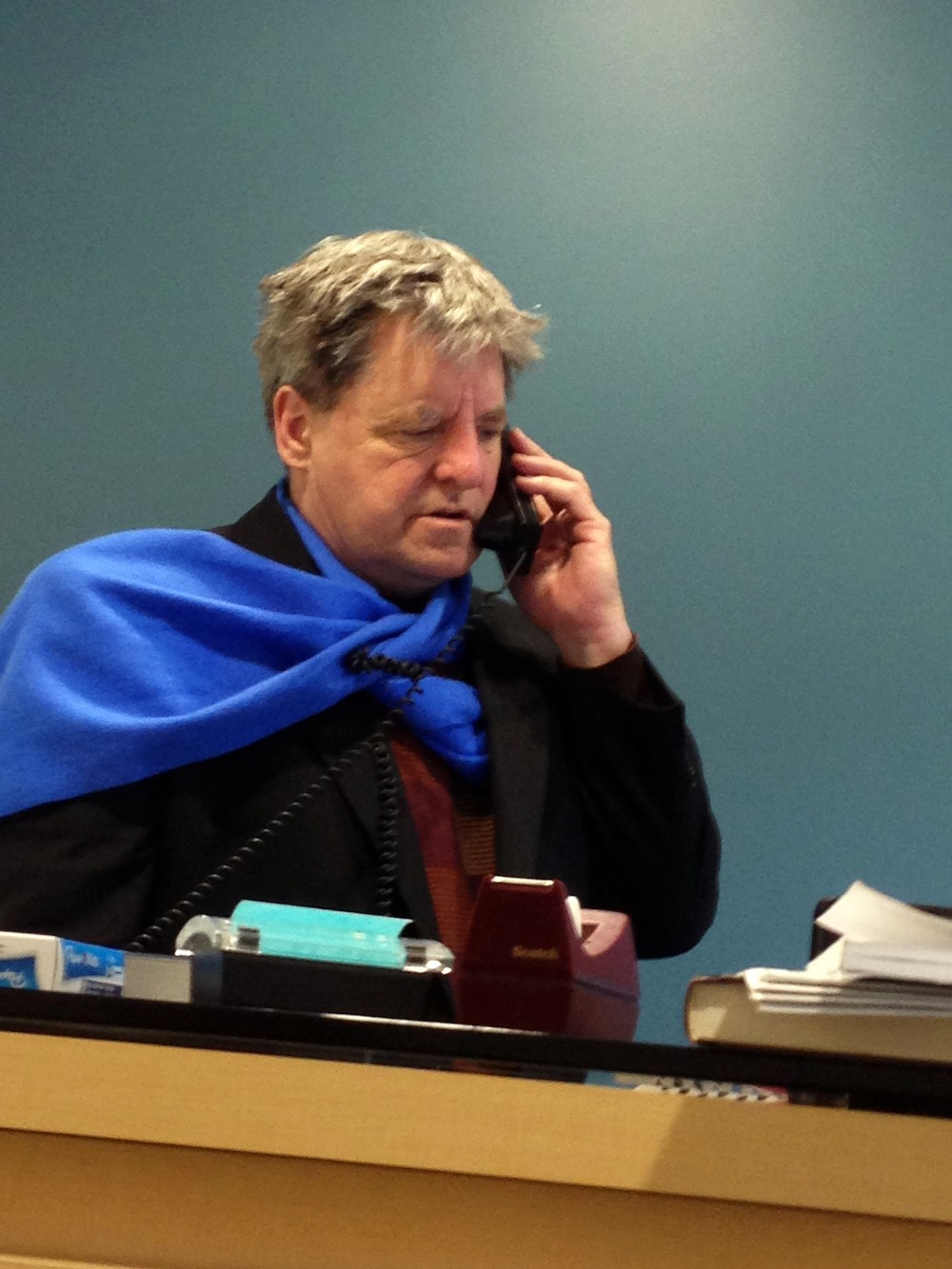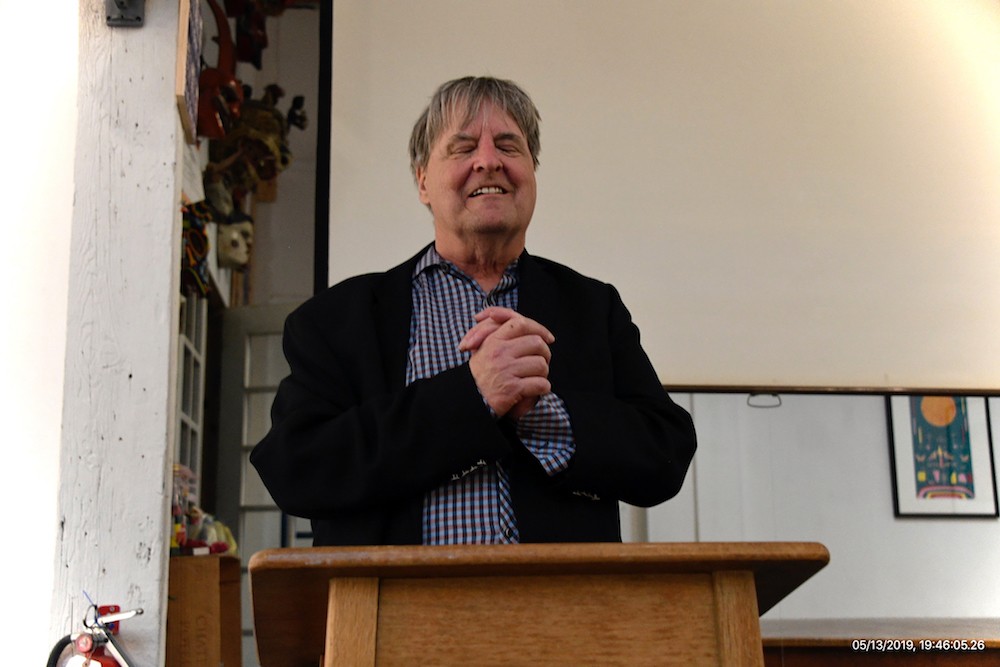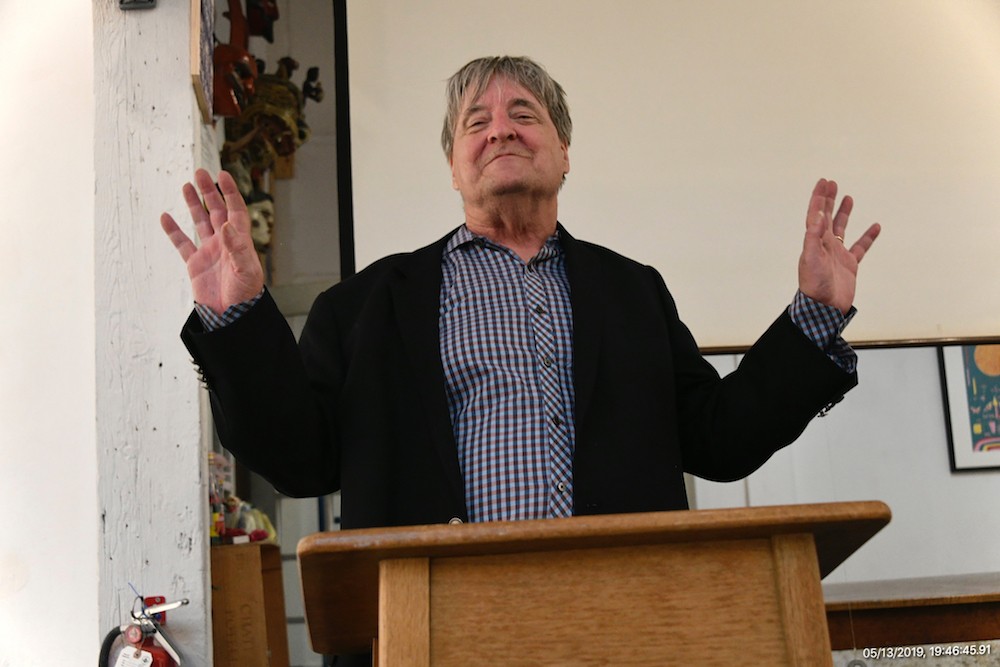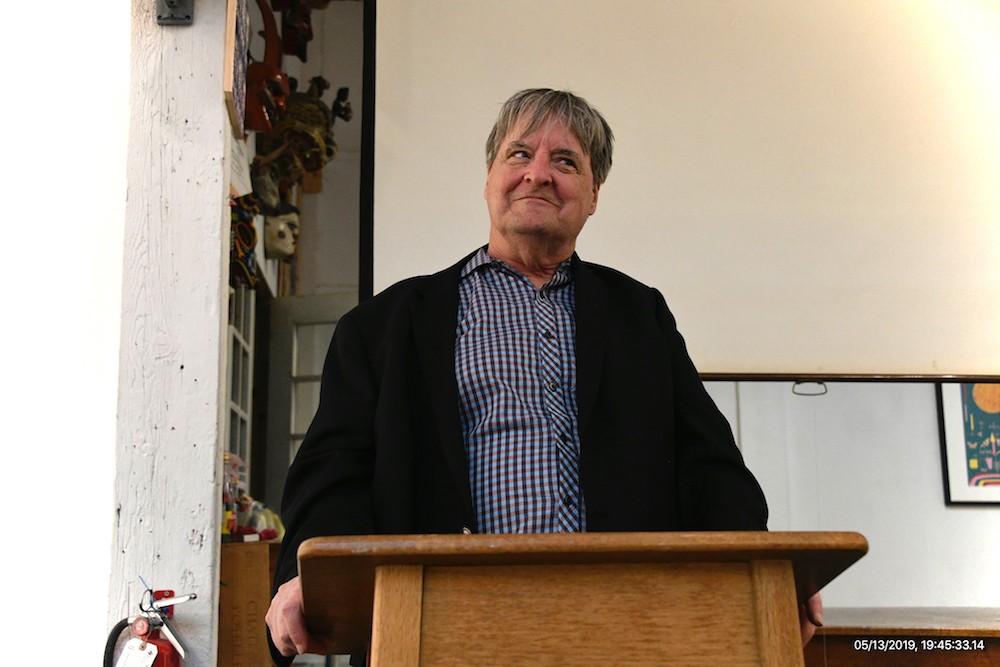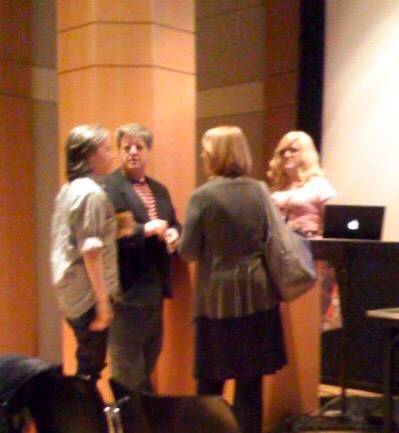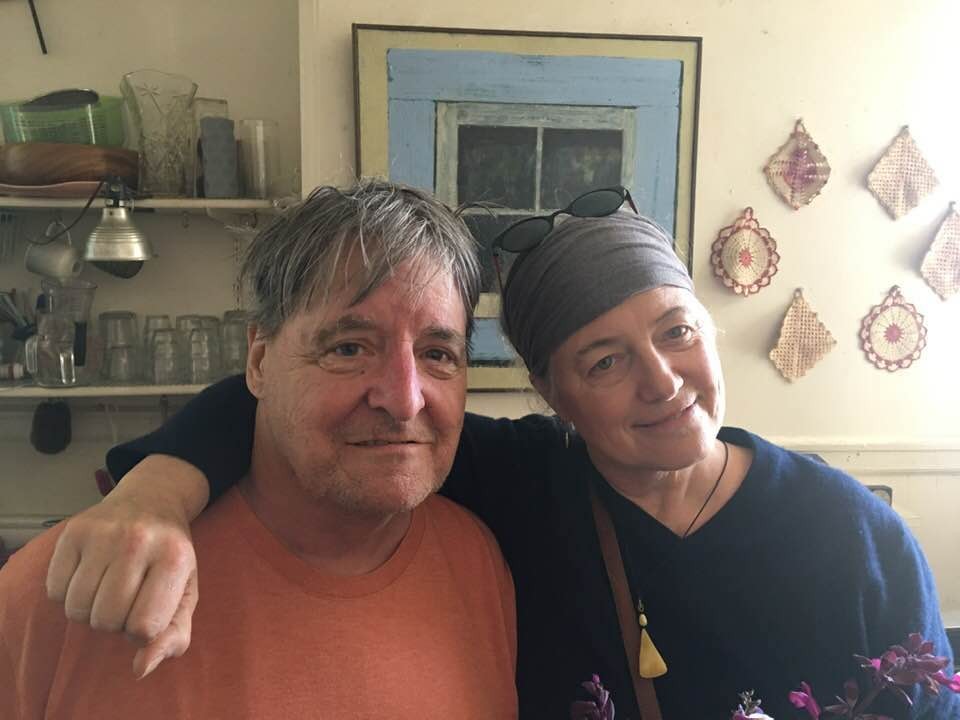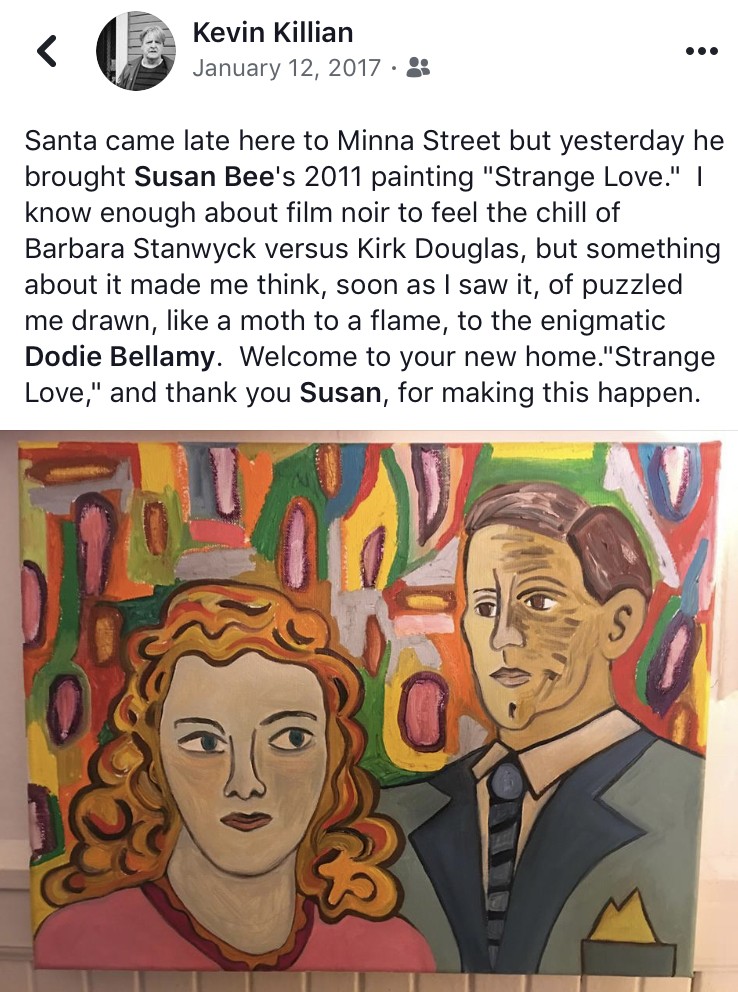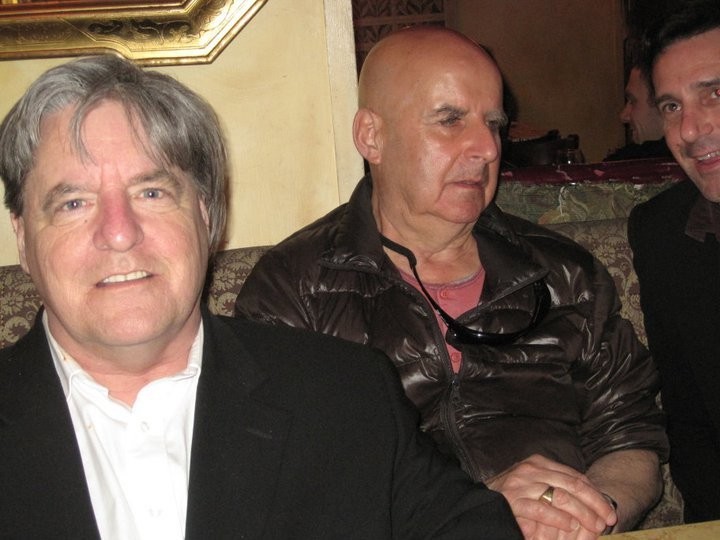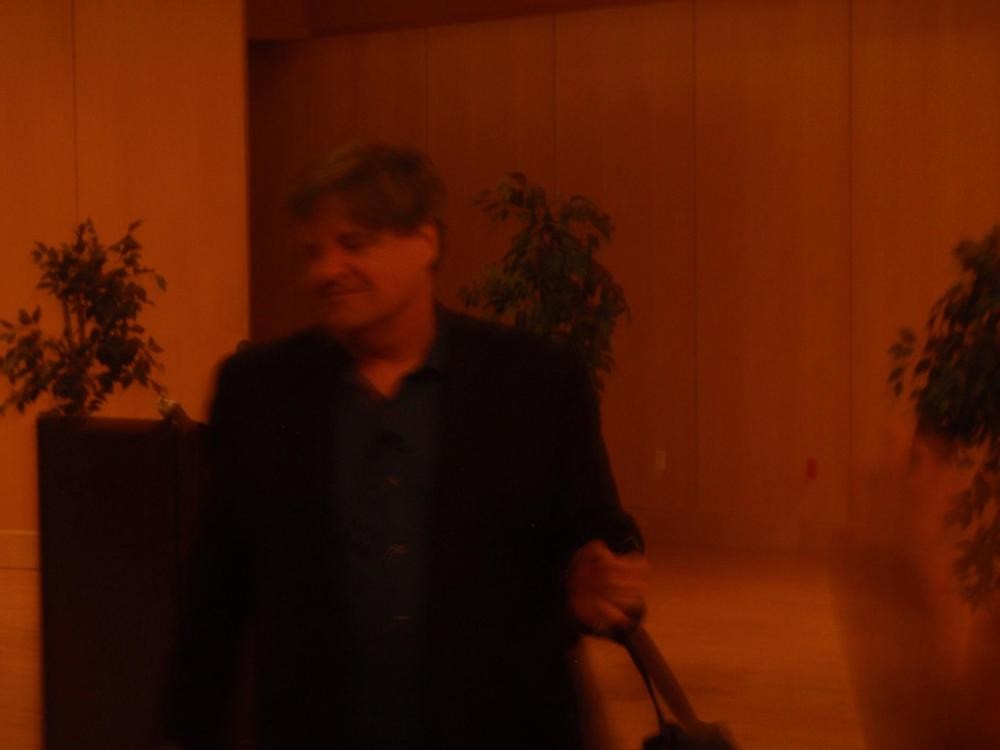Dear Dear Kevin Killian: A Collected Memory
BY Corina Copp

Consider what is to follow a snapshot of an outpouring—a tender position, what we call grief. I wish I didn’t know it so well, or knew how to know memory’s valences better, as Kevin Killian so clearly did. In the days near and after his passing into what is surely light, I was on the phone with his friend, who was at his bedside; I was talking and walking with other friends, who were thinking about him. I felt for those who knew Kevin better than I could, though our encounters and exchanges were formative, lovely. Seeing his play Wet Paint in 2012 made me a lighter person, for instance. And I feel for these writers sharing their recollections now, moved by their wits about them. As Douglas Kearney says so beautifully here, to Dodie: “I sincerely hope it gives more than it takes.” And to Kevin: I hope you’re not checking Harriet, wherever you are in the elements. We miss you. We’d be all over your face if we could.
***
Gail Scott
I am for some reason fixed on his slightly wry smile and how much I loved it and how it was also mysterious. But kind. And how he always found time to see me when I came. And how I can’t think of another writer who will be missed the way we shall miss Kevin, his kind person and his work together. A model for us all.
Ugo Rondinone
I would like to dedicate this artwork to Kevin, who always gave more than he received.
Lynne Tillman
Without Kevin Killian gracing the world I know, it has less spunk and spark. Kevin was a vital presence, and a multiple in himself: he astonished as a playwright, poet, novelist, critic. He responded to everyone, kept up a vast correspondence, read an ever-expanding universe of books. I don’t know when I found out that Kevin had written thousands of Amazon reviews. Not one-liners, but considered, detailed appraisals of books he’d read. He was so kind to fellow writers, artists, loyal to his friends, sympathetic. And playful. In the late 1990s, I think it was, Kevin cast me in a play, performed one night at St. Mark’s Poetry Project, in which I played Isabella Rossellini. Rehearsals were hilarious. He was such fun to be with.
Kevin was a warm room without a door; you entered, and he made you feel like an intimate. I don’t mean he was warm and fuzzy; he had great warmth with edges, a cutting wit that was not malevolent, but mischievous. Those of us who were friends for years knew him also as “Kevin and Dodie.” He and writer Dodie Bellamy shared a great love, a marriage of true minds.
Kevin generated happiness, through his writing, his enthusiasm for life, and he wanted you to be happy. Kevin loved life, he really did, and I wish his had gone on and on.
Erica Kaufman
When I first met Kevin Killian in 2007, I remember feeling star-struck (Bedrooms have Windows and Argento Series were books I read and continue to read repeatedly). Afterwards we began to correspond and he and Dodie included my poems in Mirage #4/Period[ical] (one of my first publications). His generosity and ebullience continue to be a model for me—any email exchange included genuine inquiries as to my own work (job and poetry), as well as banter on any range of topics. The title of Kevin’s Belladonna* chaplet (#117, published in 2008), Wow Wow Wow Wow, sums up my response to the times we got to spend together—he wowed me with his kindness, his writing, his tireless showing up for all things. I can’t help but think of the Jack Spicer quote from “Poetry and Politics” (a lecture from 1965)—“a magazine is a society.” Kevin’s (and Dodie’s) support of my person and my writing modeled for me what a society could/should look like—more than just a gathering of people, but a reverence for what each individual can contribute to a larger conversation. The last time I read in San Francisco, Kevin and Dodie took me out for an early meal beforehand. I’m normally a very anxious reader and tend to be unable to do much before an event. I remember leaving that wide-ranging discussion and venturing over to Small Press Traffic calmer than ever before.
I write this from a hotel room in the Happy Pushkin in St. Petersburg, Russia, where I’ve been teaching for the past week. I’ve thought of Kevin all week, taking cues from him to invite colleagues to write to be in imaginative dialogue, sharing his Amazon reviews, and thinking about how much he would love the sight of where I am. A hotel with hot pinkish-red walls, full of a bevy paintings of Pushkin, rooms named after women, across the street from the embankment full of cruise ships.
Patrick Durgin
In the summer of 2010 I established a listserv on “poetics pedagogy” by inviting some trusted confidants to weigh in on how they teach “experimental” writing methods. A bunch of people did so enthusiastically, including Pamela Lu, K. Silem Mohammad, Rob Halpern, and Petra Kuppers. Kevin Killian said this:
Like Patrick I'm teaching at an art school [and] I've been very much taken by the social practice students who have their own branch of fine arts, who always tell me to read Nicolas Bourriaud's Relational Aesthetics (1998) and once I did, I became excited. I asked Bourriaud how poets could use his theories of relational art; he paused then spoke dryly, “If you find out please let me know,” implying that he did not think it possible, but I think he spoke tongue-in-cheek for his book provides much food for thought and every other paragraph speaks directly or indirectly to poetics.
If you only look at Kevin’s poets theater work, you can see that he was a living embodiment of “social practice” poetics. This would be obvious if you’d ever seen or had a hand in his poets theater productions. Readers can glean this from his characters, ripped from sometimes moldy old headlines, transhistorically sharing space and setting off psychodynamics that are formally as experimental as the more clinical, syntactic brutality of Flarf, Language Poetry, or, say, Kenneth Koch’s plays in verse.
I commissioned The Kenning Anthology of Poets Theater 1945–1985. At one point we were waiting too long to hear from the executor of a certain literary estate, about a play it felt crucial to include. So another, more famous name interceded on Kevin’s behalf, vouching for him by saying “he is everywhere, and amazingly sane and generous about it.” That did the trick.
I never fully realized how he’d inspired me. When my poets theater book PQRS was launched in Chicago back in 2013, the event culminated in a super snarky salad bar. If you were involved with Kevin’s work in any way, you were going to go through something together. It was, as he put it, “food for thought.” And I am constantly thinking about Kevin.
Douglas Kearney
Grand might sound old-fashioned, and maybe it is. But that’s what comes to mind when I think of Kevin. To me, Kevin was grand in person, in personage. By no means in the sense of putting on outsize airs, but there was something about him that overflowed with a generosity of spirit. A kind of luxe good. I remember once seeing him between events at Artist’s Television Access over on Valencia—there was a coming and going feeling to things—he was leaving and I was staying. I think the program I was on was starting later than late, maybe. I can’t remember. Anyway, we chatted for a bit, and as was typical when I saw him, I kept saying in my head over and over: “That’s Kevin Killian! That’s Kevin Killian!” in recognition and in wonder. The writers I learned about as a student at CalArts have always meant something different to me than all the others—their vitality seemed less managed, constrained. But Kevin’s kindness struck me thusly. He wasn’t going to be able to stick around for the whole gig, but that was ok. I knew how he felt about the work. And besides there was that grandness, the warmth in the conversation that left me feeling: “I must know Kevin better than I thought I did.” Now, I can only wish that were so.
We will all stay awhile and we will all go. I hope we can be as kind, as warm as Kevin while we’re here, between the events.
P.S. Dear Dodie, I am tremendously sorry for your loss. Thank you for your generosity in allowing the extended community to express some of its remembrances of Kevin. I sincerely hope it gives more than it takes.
Anselm Berrigan
I’m one of those people Kevin got first or nearly-first published in Mirage #4/Period[ical]. Then he told me he’d passed out a lot of copies of that issue in Vancouver at some probably very interesting thing I couldn’t be at. This was in 1994. Did that really mean people were reading my poems? Was some kind of belief in my being a real person doing this thing, this art we call poetry, actually maybe happening? Was a person not already somehow designated to believe in me believing in me? Yes. The answer with Kevin was always yes, somehow. I will always love him for being able to see so many people making their way, however we could, and I will always love him for letting kindness be a value, on its own terms. I was at Dodie’s and Kevin’s place on New Year’s Eve ’94 going into ’95, and marveled at how the books bulged out of the shelves & took up half the space, just the way they did in the impossible invitation of an apartment where me and my brother grew up. All I felt was fall in love. Like we could participate without looking around for permission, and go from there.
Dorothea Lasky
Kevin, you are a person who made me feel like I mattered. It was a rare gift you had to make everyone around you feel like life meant something. You cared so much. You cared about all of us so much and were devotional in this caring, always knowing people and their work in surprisingly intimate ways. You always were genuinely interested in people—in their personal histories and motivations, in their points of entry and wounding, in what might make them love or hate. When I think of you now you are like that blinding bright orb in the center of every photograph. The kind of spot where people ask you what in real life could have been so bright to have burned out the picture. And most of the time you have no answer because it is seems unimaginable or impossible even. But you pulsed on, despite whatever makes sense about things. Of course, all of these statements I am saying right now could be applied to your language, too. In your piece “Santa” in Little Men, you write at the end of it, the lines: “Me? I was his whole life, and now both of us are gone.” Except I refuse to believe you will ever be totally gone. Your work will be that blindingly bright spot in the center of the picture. I’ll look for it, and I know it will look for me, too. See you soon, my friend.
Rachel Levitsky
I encountered Dodie and Kevin (exist in me always together) intimately the summer of 1998 on my way out from an MFA course of study at Naropa’s Summer Writing Program. Meeting Dodie and Kevin in weird scary white Boulder in 1998 slapped my face back into Queerness in a way ridiculously surprising considering how gay I consider myself. Like jumping into 50-degree pacific ocean. What sort of a fagala was I? What laziness and out-of-it-ness had being me at the Buddhist school made of my separatist lesbian feminist loud messy jewish communist me and why the fuck did I hide that I was fucking a cis man. There are people as queer as Dodie and Kevin and their totally beautiful errant abject unhidden cunt and penis and limpid and wet and hard and dependent and erudite intimate consequential impossible sick legible uncomfortable happening in front of your face daring you not to turn away selves but there isn’t in my mind anyone queerer. I feel most of the rest of us these days fade in while Kevin and Dodie keep it so seemingly seamlessly blatant, from the first thing I knew about them, their marriage on Valencia Street’s Kentucky Fried Chicken through the long duration and present of their zine Mirage #4/Period[ical] and all the dirty things they published there, from their tiny Minna St. apartment, right up to this very day.
Never making it easy only making it loving.
I want to say out loud now until I can say it better, that Kevin is in my mind uniquely not a misogynist. Not unique because he was a man, not unique because he loved women (I think women have the harder struggle against our misogyny), but unique because it wasn't apparent and it didn’t appear. None of that sting. There are many new Kevin habits I want to practice in his honor, most of all this, to be ever more easily kind and aware of the pains of the butches and the ladies and all of us beyond and in-between.
Jennifer Scappettone
The first mention of Kevin in my inbox hails from October 11, 2001, in a note from Lyn Hejinian supplying me with the email addresses of people that Joshua Clover and I can invite to C21P, a reading/talk/potluck/dance party series in Berkeley. Kevin is at the top of her list, a fact which stands out in retrospect. He was always so buoyantly present, even at events pitched by people who were young, unintegrated, wholly unproven, across the bridge; and he glided like Ginger doing Astaire backwards and in high heels never breaking a sweat over the standard narrative lines that literary historiography has already begun to petrify in its need for category sterility and division. What he projected to this (still) naïf was an abounding enthusiasm and receptivity, which I read as love for seemingly everything—love placed between us all, that is, in an unpossessed way, for the taking up. Kevin would go on to manifest, time and again, as Kit has transcribed, that “all [he] ever wanted to do was make people feel happier and love themselves for who they are.” He did that unremittingly by showing up, editing, reviewing and curating, directing, photographing and above all, writing the homely unawarded community into Sevigny and Pettibon fabulousness—and by expressing his majestic love for Dodie—all under the press of nightmarish circumstances like the ones we are currently living and their prelude in the Second Gulf War which provide the accidental frame of my history with him.
It’s not an obvious frame—because Kevin’s ebullience seemed to refute the historical darkness of these moments or of the AIDS crisis, though his writing makes brutally plain that death was its punctuation, its foundation the skittish luck of survival. With relentlessly cruel community-rending circumstances as the implausible context, and through innumerable displacements from San Francisco, for no good reason beyond generosity surplus I was among the expanse of the blessed to be of the commons that emanated from him, to receive Kevin’s OMGs and exclamation points—up to the last selfie we took in late May, when he told me “I feel okay!” so energetically that I (damn me) believed it. Invited to “star“ a couple of years ago as Dora Maar in Box of Rain, I held back because it would have meant schlepping back to Chicago in mid-December. “My play is…a social comedy à la Charles Ludlam,” Kevin beckoned, “laid in San Francisco at a once-proud art gallery, now suffering the loss of its famous artists. It is light and funny, though has many spooky moments, for it depends on an ancient fax machine that, the tenants discover, contains a two way communications line with hell.” In the magnanimous aura of Kevin we were all stars, or made of them. I fear for a world that lacks his spooky humor and honey. And would walk through nine-hundred blizzards to have the chance to play his Dora Maar right now. I’m doing it.
Liz Kinnamon
At lunch one afternoon with Kevin, Claudia La Rocco, and J. Gordon Faylor Kevin told us he worked at a janitorial company. He had been working the same office job for years, in what he called “ordinary life,” and he was meeting us on his hour-long lunch break. This was incredible to me. It didn’t seem widely known. Kevin Killian, co-author/editor of two books that changed my life—Poet Be Like God and My Vocabulary Did This To Me—wasn’t bankrolled by academic or family money but had a secure, working-class job. In the genre of maintenance no less. There was something so wholesome, fortifying, and sneaky about it. Fly under the radar, work your whatever job, be a star. Just like that Kevin’s life, along with his work, projected a way forward.
What struck me was his openness and excitability, even as a beacon of prestige, history, and fame. Many people have commented on Kevin’s seemingly endless capacity to give, and that he was connective tissue for younger generations to the past. He certainly kept the spirit of ’70s and ’80s gay cruising alive. But another powerful lesson of Kevin’s star is that being accomplished is not synonymous with inaccessibility. In fact, he reminds us that what we gain by being available is more important than what we think we might lose.
Eileen Myles
Joseph Mosconi
A) 1994: I am lying in bed with a friend, far past midnight, reading aloud Kevin Killian’s dramatic monologue “Who Is Kevin Killian,” pausing intermittently to laugh at the brilliance of the text. Earlier that night Kevin had performed it at UC Santa Cruz in front of a grand piano (“Just like Michelle Pfeiffer in The Fabulous Baker Boys!” he would tell me years later.) My Semiotics & Psychoanalysis professor, Earl Jackson, Jr., had placed several books by New Narrative writers on his syllabus, including Dennis Cooper’s Closer, Robert Glück’s Margery Kempe, and Dodie Bellamy and Sam D’Allesandro’s Real: The Letters of Mina Harker and Sam D’Allesandro. Professor Jackson had gifted me a copy of Kevin’s text, not yet published in journal or book form, and I was reenacting Kevin’s performance for the benefit of my friend, who had not been able to make the reading. At least I think that’s what happened. It’s all very hazy. I remember ambushing Kevin and Dodie at the post-reading dinner with copies of Shy and Real for them to sign. I was a total fanboy. “Why don’t you come in and join the dinner,” Kevin kindly suggested. But I took one look at the administrators and department heads eyeing me suspiciously and decided to pass.
B) 2005: Kevin writes me out of the blue to tell me how much he loves my blog posts about the Oulipo conference in Los Angeles. He doesn’t remember meeting me 11 years earlier in Santa Cruz. We discuss Ryan Trecartin and Barbara Guest. “I missed Barbara Guest's funeral so I felt strange, uneasy,” he writes, “as though I were on holiday at the wrong time, like the episode of red shoes of the Duchess in Proust.”
C) 2010: At a non-descript San Francisco diner for lunch. Having a hamburger with Kevin Killian.
D–Z) The rest are private memories and there’s not enough room to recount them all here. One day, if we meet in person, and we get along well enough, perhaps you can ask me—and then we can talk about Kevin Killian.
Carla Harryman
Untitled
We were born in the same year, 1952
Yes, it’s true he writes on May 27, 2019
And that he has five books to finish
The day before Stage Freight launches at The Stud
Those ghosts in his plays gifting his banter in the bodies of the living
Boxes of rain, rerun redone as constellations of “loss
That experiments with forms of healing” (Maxe Crandall)
Many of these I’ve missed after 1996
In the space between San Francisco and Detroit
My blurb of Little Men mentions impossibility and jewelry, perfect palpability and paradoxical charisma, pleasure of affront, and the end to middle brow culture
His note of May 27 recalls a stage shared in the past and a “delicate time” in his life, which leaves me searching through buried files of memory to keep the past open to what lives and stumble on his reminding me of “Ghost Parade”
I love his use of the words “delicate” and “chivalrous” in correspondence
Between then and now fantasy and death mingle in
A deep purple-red dress, like a toga taking charge of art
Wearing Kevin Killian playing Giantess in Third Man
Directed by Mac McGuiness in 2010
He remarks on not being able to lose his own voice, a memory
Reads from a stool with broad gestures, reigning in Giantess such that
Space is given to the general good and the actual persons on stage
In Memory Play (1994) directed by Absolute Man Pussy
Philip Horvitz (1961–2004)
Kevin
Embodies an absurd, enigmatic toy
Yesterday, I dreamed him singing “…anyone can tell/You think you know me well/But you don’t know me”
But with so many rehearsals, the toy will get bored
Needs more lines,
And even as it was sent me twenty-five years later almost to the day
This could be among those
“The mob hates anybody the least different”
That he penned
On scraps of paper secreted in pockets and creases of his
Robes, in which he loitered on the edges of John Woodall’s salt-flat set
John Giorno
Matias Viegener
I found solace after Kevin’s death by reading his 2,639 Amazon product reviews. They epitomize his genre-bending work: memoir, fiction, poetry, and love letters to the vital forces of literature, consumerism, celebrities, and pragmatism in swooping sentences in which belles lettres nestle into gossip. They are affective and ironic deposits made almost anonymously in the world, like poems left on bus seats. The narrative impulse meets poetic condensation in reviews of the object world tinged with their own self-awareness. But were they anonymous or did Kevin intend for us to discover them? They were never a secret; in fact, three slender volumes of them were published over the years. Who then was the intended reader? Meticulous Amazon shoppers, of course, but also the literary reader seeking Kevin’s work, an echo of Amazon’s roots as a bookseller. But the real intended reader is imaginary: a fantastic new reader, compelled by Jack Spicer’s poetry, Dodie Bellamy’s Dracula, the nicest flannel sheets, and some Advil. Kevin’s reviews are an effort to transform the world’s readers into his own image. I’m told he turned to them after his first heart attack as manageable bursts of writing. Dia Felix, editor of the third volume, says “they are wise and have the perfume of the afterlife.” My favorite is “The answer to deep grief,” a review of MacKenzie’s Smelling Salts. It opens with Kevin’s crusty grandfather who derives some erotic pleasure in spanking high school students. When they faint he revives them, opening the “doors of perception.” Kevin uses the salts to revive himself, especially from the near-death experience of rejection from the Whitney Biennial. Then “you’re just yourself again, your very best self.” Philosophical speculations that oscillate between the poles of sophia (wisdom) and mere doxa (opinion) to obliterate their difference. A new literary form that like consumerism, exceeds the boundaries of life and death.
Donna de la Perrière
When I think of Kevin, I think of lots of things, most of them so simple or maybe complicated as to be almost ineffable: his kindness, his huge talent and louche, throwaway grace; the way he’d walk into a room carrying a nylon, collapsible tote bag, which, as he carried it, became the most glamorous normcore object in the world; or the way he’d stand beside a podium, bowing at the end of something, spreading his arms dramatically, purposefully, all lit up; and now also the way he lay in bed the night before he left, during a brief stretch when Dodie was trying to sleep in the family waiting room (she was there for less than an hour; it would be a long time before she slept); the way the various machines monitored his heart, kidneys, lungs—all his material faculties that were rapidly failing; a breathing machine whooshing air in and out of his mouth, and in and out of his body (his chest lifting, then with a second whoosh lifting even farther; the way his body rose and held there for a taut, split second before it fell) and the machine on his left making electrical outlines, etch-a-sketch drawings of Indiana or Ohio; and we read him psalms and held his left hand that lay curled outside the covers (the right was already tucked away beneath the sheet). For a while, I stroked his forehead like he was a child with a fever, but who knows, that may have been more to comfort me than to comfort him, as he lay there, waiting in the high, dim light—so utterly himself, even as he was becoming something else.
Tom Comitta
I always knew how special Kevin was, but it wasn’t until his death that I was able to understand the full extent of his impact on writers and artists everywhere. Seeing the number of online tributes and in-person memorial events across the U.S., I couldn’t help but think that Kevin had some kind of superpower, with the energy and heart to maintain such deep relationships with so many writers; all of this while juggling a day job, teaching, going to just about every reading and art opening in the Bay Area, and finding time to be a prolific writer (at the Poetic Research Bureau’s memorial event for Kevin, Andrew Maxwell noted that Kevin wrote enough Amazon reviews to fill 60 poetry collections).
My relationship with Kevin had a lot in common with many of those that I’ve heard and read about; Kevin was encouraging and taught me things about writing and writers that you’d never learn in print (i.e., lots of good gossip). As his student in grad school, I found him to be the best kind of teacher—one that doesn’t try to shape you into his image, but helps you to write (or maybe just be) more like yourself. After grad school, Kevin helped me through some difficult times, taking me out to lunch when I was broke and acting as a model of what poetry and sobriety could look like. Kevin was the best kind of friend, a true poet, and an inspiration. It was a gift to know him, and I can’t really imagine where my life would be without him.
Michael Lally
Kevin Killian and I first knew each other in the 1970s, mostly through the mail and mutual friends, especially the late poet Tim Dlugos who was one of my closest friends from the day we met until the day he died from the AIDS plague.
I can’t be sure about earlier meetings, but Kevin and I spent a lot of time together when he and Tim and I read at Stony Brook on Long Island in March of 1980 (I know the date because on the ride back to Manhattan in Tim’s car, Tim interviewed me for Little Caesar magazine and mentions Kevin and our reading in the interview).
Kevin and I saw each other again over the years and read a few times together in the last century. It was a pleasure to see him or be in touch in any way. He was always generous with his praise and his love. He contacted me not that long ago about hopefully seeing me soon, despite the reality that he was sick and that was unlikely.
He was an open-hearted poet whose personality and work had a widespread impact on all those who encountered either. His last words in a message to me were “I love you.”
Cole Swensen
To think of Kevin is to smile. And I’m sure that everyone who knew him has the same experience. The warmth he emanated was simply marvelous. As was his generosity. One instance of that generosity that I’ve always loved for its sheer enthusiasm and oddity were the introductions he used to give, introducing poets at poetry readings in the 1980s and ’90s. They were always over-the-top, extravagantly, lavishly complementary, and often outrageously inventive, including facts and anecdotes that were as clearly untrue as they were delightful. It would be a real gift if they could be gathered and published, but as the genre—and he made it into a genre—is, by its very nature, ephemeral, I don’t imagine that’s possible.
He came to Brown in the fall of 2013 to do a week-long residency on poets theater. I’d called him and asked him to come for the week, and he said “Sure, as long as you don’t want me to get the students to conceive, write, produce, and put on plays in just that week.” And I said, “Yes! That’s exactly what I want you to do!” He came and did a brilliant job. What started out with six or seven students soon involved the whole department. The plays were dazzling and funny, with props including a dozen umbrellas and two dogs. He brought with him a sense of community as based in exuberance, invention, and love. He was much loved in return, and will continue to be.
Joseph Lease
I was shy and excited. It was 2003. I called Kevin. In 1993, the Bay Area seemed like magic to me. I gave a reading at Small Press Traffic, and Kevin introduced me. I was stunned by how deeply, how wisely, how wryly, how clearly he understood what I was writing and who I was. In 2003, I was living in Michigan, and I was going to move to the Bay Area for a job. I called Kevin. He said let’s meet at SFMOMA. We spent the afternoon there, and I knew my life was going to be fine. Now, like so many others, I think of Kevin as one of my dearest friends, I can’t imagine life without him. I believe he is one of our greatest writers. Start with Argento Series: on the back of the book, Kevin writes: “1991 Kevin frozen, unable to think of a way to write about AIDS crisis, 1992 Kathy Acker suggests films of Dario Argento as a prism through which to take apart horror of living and dying in AIDS era”—through which to take apart (so wise, so brave)—“The tricky part is keeping your eyes. // Loving isn’t enough, not with needles // . . . Now he’s back to give me an opera / dedicated to my name / in his theater holy with my death” (“Opera”). Kevin’s poems are so graceful, uncanny, impossibly awake and perceptive and heartbreaking and brilliant in the middle of the dying: brave and visionary, endless.
Cam Scott
I met Kevin Killian in 2011 on pilgrimage to San Francisco, in large part to meet the author of Argento Series, which had jumpstarted my own writing on contact. My friend Colin Smith put us in touch, and Kevin responded quickly. “I like everything Colin’s told me about you,” he signed off, an incorrigible flirt from the first. So I met up with Kevin and Dodie, whose Letters of Mina Harker I similarly revered, for an exhilarating weekend. I remember going to see Kitch’s Last Meal by Carolee Schneemann, whose name Kevin was delighted to add to his autograph book. Later on Minna Street I was conscripted as a model for Kevin’s photo series, Tagged, a role I’d reprise with greater poise and fewer clothes some four years later, testament to Kevin’s mad endurance.
At the end of that first trip, Kevin asked to see my writing, so I dashed off a digital sachet of what I’d now call juvenilia. His reply was thorough and unsparing: “Cameron can do better.” (Count those stern extra syllables!) One element that he singled out for praise, however, was the title, ROMANS/SNOWMARE; so, taking his admonishment to heart, I kept the name and started the project from scratch, hoping he was right. (Kevin was usually right.)
Seeing Kevin on his many visits to New York was always a thrill, whether I was helping stage obscene tableaux in a converted church or simply lapping up his every anecdote. Above all I recall his love of writers, which unfurled a litany of names. He celebritized us, as a function of his own writerly knack for drafting madcap correspondences, and in this calling his whole life might have been Poets Theater. How lucky we are to have played even the smallest part in Kevin Killian’s world, and to have had him in this one. I miss him needfully already.
Jocelyn Saidenberg
Kevin Killian was a world-builder. Out of his heart he assembled realms for his communities of writer and artist friends. In otherwise indifferent times, he made a home for us to dwell in. Kevin felt the beauty of what he gave. With exceptional generosity, curiosity, wit, and steadfast belief, he animated a magical carnival for us to inhabit, finding his pleasure in ours. He was our prince.
I first remember meeting Kevin in 1996 at Bob Glück’s house, where Bruce Benderson was reading. Over the years, we collaborated as friends on projects and in life, editing and publishing books, creating poets theater, working on Spicer’s archives, hosting readings, mourning the loss of friends and beloved pets. The first role he invited me to play was that of Barbara Bush, who enters out of the blue to school and then seduce Sylvia Plath, her secret crush and classmate from Smith College. Since then I have played Ashley Judd, Jaclyn Smith, Lindsey Lohan, Clarice Lispector, and other astonishing roles that Kevin wrote for me. He taught me that with a wig and amateur costume—under his direction and with fellow artists and writers similarly clad—I could become something much more than my habitually shy, awkward self.
A testament to his generosity, a generosity scarcely visible yet so unstinting, were his rejection letters for Krupskaya Books. He wrote them with such encouragement, insight and care that many writers sent notes of deep appreciation and several became friends. Even when delivering disappointing news, Kevin made people feel seen and recognized for their work, summoned into a conversation that sustains and nourishes us as writers and artists. By inviting me to abide in his beautiful experiments, Kevin showed me a way of being in the world, one now vastly diminished.
Norma Cole
Kevin really liked ice cream, especially chocolate. When he and Dodie and I went to teach for a week in the summer program at Naropa, 2014 (where Kevin and I taught together—a playwriting seminar) we picked up a rental car in Denver, drove to Boulder and used it to get around. For instance, we had little fridges in our motel rooms, so we went grocery shopping together. And Kevin always went right for the ice cream. I thought of it because the last time I saw Kevin eating ice cream was in the hospital. He had a tub of chocolate ice cream and a teaspoon and was just digging in. I didn’t take any pictures that day because he was in his hospital gown and I didn’t want him to look back on that time and see that gown. Or I didn’t want to see him in that gown because I believed we would have him with us for longer than we did.
Robert Glück
One sad day Kevin and I were writing Steve Abbott’s obituary. I can’t remember for what publication, and now that Kevin is gone I will never know. Kevin was Steve’s literary executor, a role he filled for Sam D’Allesandro and others. How did Kevin find time to do all this? One of his many mysteries of abundance. He was an ardent fan of the soap opera Santa Barbara, and he told me that he wrote to every person in the cast of every season, and managed to get replies from all of them. But he didn’t always write as Kevin, he wrote in different personas, including two teenage girls. When the eager dentist from South Bend didn’t get a reply, sometimes the plaintive grandmother from Dallas would. This was a precursor somehow to the thousands of hilarious Amazon reviews he wrote, sometimes about products he never used or books he hadn’t read. Kevin had a fairly tale ability to spin straw into gold. He seemed to possess a magician’s secret of happiness: that meaning is not in short supply, that there is meaning everywhere, everything is somehow connected to everything else, and you must give yourself without restraint to the matter at hand because pleasure and safety are opposites. As we were writing Steve’s obituary, Kevin dictated: “You never knew who you would meet at the huge round table in Steve’s kitchen, Bruce Boone, Kathy Acker, Dame Margot Fonteyn!” “Now wait a minute, Kevin. You were never going to meet Margot Fonteyn in Steve’s kitchen.” If there’s one place to keep to the facts, it would be an obituary? Kevin looked slightly indignant because I was making the world smaller. He said, “But you could have.”
Tina Darragh
As most folks would say, Kevin was always so positive. He asked me to write a play for the 2002 Poets Theater in San Francisco, but I told him that I’d never written a play and didn’t think I could do it. He said “Of course you can!” So I tried and came up with “opposable dumbs” and he said it was more than fine for the Poets Theater. Now I write agitprops on a regular basis and thank Kevin ahead of each one I write. I know that Kevin was an inspiration to so many, and I like to count myself in that crowd. He would give things a broader focus, and encourage others to do the same. I don’t know if I can write anymore agitprops now that Kevin is no longer with us. He would say “sure you can!” Kevin will be missed for his multiple talents and for his positive thoughts. He was the “light” in many lives. I know that lots of folks will feel the lack of his spirit as they try to carry on.
Jacob Kahn
It’s no surprise I was pretty enraptured the first time I met Kevin Killian. I saw him read here in Oakland where someone informed me, duh, that’s Kevin Killian, a fucking legend, go home and read everything he’s written. A legend, sure, but also THE SAINT OF UNKNOWN POETS, Kevin implored me to share who I was and what I was doing here. And what was I doing here? I had no clue. Kevin seemed to know better than I did. He had a rolodex memory for artistic nobodies, tolling my name months later when I finally moved here—“Jacob Kahn, the poet from Montana”—and giving me (and everyone) my first reading in San Francisco. After the reading, he bought several copies of my chapbook and proclaiming, “You need to read this!” gave them to the most famous poets there. I was smitten. There was crazy charm in his careening daffiness and endless fascination with others, a legend who made himself a steward, Icarus who told his dad to fuck off, and his friends to come close, our Bay Area teddy bear, a talisman of joy and solace who clearly relished being that doorway into a world of poetry and art and sociality, making it a point to make it broader, easier, full of more color and promise, like Joseph’s dreamcoat, than one could ever hope or envision.
When my dad committed suicide five years ago, Kevin was one of the first poets I told. He actually drew it out of me, as I was sulking perhaps, maybe at a reading, tight-lipped about my grief and trauma, and Kevin, ever-the-antennae, sensed this. Of course, Kevin knew loss, knew personal and communal trauma, so to have him feel that and reach out, and continually check-in, was tremendously, eternally meaningful. Still one of my absolute favorites, Argento Series was to me a manual in grieving and I clung to it, or perhaps it clung to me, like that dreamcoat, helping me carve out space for this duration which is loss, a duration and an intensity, a strobing yield. Not everyone can make this much space for others; Kevin did so gravitationally. In his art and life. Was there a difference? He gave so much and asked little in return. Maybe just that I get naked and be photographed. If that was cool. The last email I received was when he got out of the hospital a month or two ago. It read so ludicrous and buoyant, something like “Jacob, now that I'm out of the hospital, I have so much renewed vigor and have this idea for a new book! Something for Wolfman perhaps?” Honestly I laughed out loud as I couldn't fathom this was the spirit he was in post-hospitalization. Who does that? It filled me with so much hope and joy to be among the living and the dead, in the passage between, to have known Kevin Killian and to have him know me.
Ted Rees
Dear Kevin,
Seven days after your physical body left us, Theo and I sat down to watch Un couteau dans le coeur, the 2018 film about a murderer killing a gay porn studio’s models in late 1970s Paris. I’d been watching Argento and Bava films while re-reading your Argento Series, and the reviews made Un couteau seem like it might be a successor to gialli, plus it was queer and starred some gorgeous actors, so win-win, right? I thought it might cheer me some, since your absence had been palpable all week, my spirit bereft.
The film transported me back to the period when we first became close, when I was your student and you my mentor. At the time, I spent most of my hours outside of reading and writing on a search for other young men to sleep with. I wrote about San Francisco and my dreams, about web-cam videos and capitalism, about the itinerant life I found myself dwelling within, and you pushed and encouraged me always. You saw something in me that I had trouble seeing inside of myself, really, as I hopped from bed to bed. We crushed on each other, but our affection was based in intellectual and social affinities, mostly. It continued this way for years, even after I moved away. You made me feel worthwhile and loved unlike any other person I’ve known.
The film ended with the murder victims and their loved ones alive, caressing and smiling at each other in a room resplendent with white. Your lover Arthur Russell once sang, “I wanna see all my friends at once,” and the finale seemed in that spirit. I wept then laughed, thinking of you now in a similar room with so many of your friends, how lucky they are and how lucky we were to have been with you here on Earth.
Love always,
Ted
Jamie Townsend
This first time I met Kevin in the flesh it was literal; I was naked within an hour. This most likely isn’t a shocking statement, as Kevin’s Tagged art project drew all sorts of attention and people willing, if not eager, to strip down, variously position a Raymond Petition drawing of a cock and balls, and be captured by Kevin’s complimentary gaze.
In 2013, when I was still living in NYC, I made plans to visit to the Bay Area. At that point Kevin and I had corresponded a little. When he found out that I would be visiting he generously set up a reading with Dodie Bellamy and asked if I would like to participate in Tagged while I was out west. After a very nervous, self-critical morning of getting ready, I found myself standing in a ill-lit artist studio in downtown San Francisco where Kevin very sweetly eased me out of each article of clothing as he shot photos and chatted about writing and art, mutual friends and people I needed to meet. It all seemed oddly natural. Kevin’s unassuming charisma and gentle humor about the whole potentially awkward, uncomfortable situation transformed that hour into a perfect way to get to know someone.
After I moved to Oakland in 2015, Kevin and I became closer friends, sharing occasional coffee dates, trips to SFMOMA and quite a lot of gossip—but that first lovely, vulnerable meeting is what comes to mind when I think of him. Kevin made everyone feel like a star, like they were special. It felt like he was writing a very long, beautiful, funny, and heartbreaking story where were all main characters, where, for each moment we spent with him, we became more interesting, more alive versions of ourselves. I’m so lucky to have had him in my life.
Lindsey Boldt
I just stumbled on these photos of Kevin and Dodie’s Fitzgerald tarot deck with text by Jack Spicer as I was searching my inbox for emails about Kevin’s Poets Theater plays. Treasure! My favorite is the one with Kevin’s classic drink, a Diet Pepsi, in the shot.
Steve was writing tarot poems back then and Kevin invited us over one night to play with the cards. It felt at once like we were being initiated into a deep mystery cult and like we were kids laughing and playing a game—that both/and reverence/irreverence, teasing/praising twinkling between things that Kevin did so well. After looking at the cards, Kevin brought out a big black book with some of Jack Spicer’s handwritten poems. As I sat on the futon in the living room and ran my hands over the pages, my head spun and the room felt thick in that way it sometimes does.
Kevin told us how Spicer would often wake up in the middle of the night, usually after a long bought of drinking, and write poems (via dictation) that he wouldn’t recognize in the morning. If we’ve ever doubted the connection between poetry and magic and the fact of our magical poetic lineages, well, there you are. Kevin initiated so many of us into so much magic, without ever saying the word. Why did it take me so long to see that the magical mentor I’ve always longed for had been with me all along?
Kevin, Kevin, Kevin. What a magic word. Thank you.
CAConrad
First, my love to Dodie Bellamy.
Getting to see Kevin Killian was always a treat, whether in NY, Philly, or of course San Francisco. Whenever visiting Kevin and Dodie, I was afraid of being a pest asking to see the Jack Spicer tarot deck. He jokingly said once, “Here, I got them out yesterday ahead of time because I know you really come here to visit these cards,” and then he laughed.
He had such an abundant life among poets and artists that always made talking with him a history lesson, but not sterile; he had a way of telling us about our heroes, which made them real humans. He told me how Jack Spicer taught history class to his students in reverse. He said, “Imagine teaching history where the first day of class is reading the newspaper, then eventually working your way back to ancient Egypt!” A few months later he interviewed one of Spicer’s last living students on stage at the Poetry Project at St. Mark’s, it was like he was getting us ready for the most extraordinary details about this world, or the possibilities of it!
We met at a poetry reading in the mid-90s at City Lights in San Francisco. It was a challenging time with so many friends dying of AIDS, and he had a beautiful way of talking about it like we were going to make the world a better place with our struggles. I am sure he was right. I know the world is much better for having had him in it. Not “had”—he is still here, and his books will always be with us. Argento Series or Action Kylie, I cannot imagine life without these books! I am grateful and fortunate to have met him.
P.S. Kevin and I are both in this Gabe Rubin and Felix Bernstein film, BOYLAND.
Rob Halpern
Kevin’s death is as devastating as it is inassimilable. I spoke to him by phone the evening before I left for Europe at the end of May and while he expressed fear of what lay ahead for him, it was his vitality & optimism that carried our convo as he was so excited about the launch of Stage Fright that would take place that evening at The Stud, and we laughed about the ridiculous premise of "Box of Rain,” the play to be performed at the launch, with its fax machine possessed by Siri, and we reminisced about its first performance years ago, and Kevin helped me to remember who my date was that evening, and as always I was seduced by his enormous energy & enigmatic spirit, and when we said goodbye I felt cautiously hopeful that his passion for living would carry him thru this crisis. The other day, I said to my friend John that Kevin possessed a modest saint-like quality, to which John responded, yeah, coz to be a saint one must not want to be one, and Kevin seemed to carry that indifference in his generosity & love. I’ve often thought that Kevin avenged himself on the world’s unreason & violence with an evermore unreasonable hospitality & care, of which he possessed a mysteriously endless reserve, and it’s impossible now to imagine the world I want to live in without him. Kevin held so much community knowledge & history, and he carried so many of our dead, that his passing, I realize—and not without alarm—asks all of us who knew & loved him, or knew & loved those he carried, to become more capacious, more loving, more hospitable, more compassionate, in order to share some of what he bore, without it ever being a burden, because for Kevin it was an inscrutable & unassuming affirmation. In his “Notes to Second Avenue,” Frank O’Hara responds to the rather insipid request by an editor—ostensibly for the sake of readers—to explain what the poem “means,” as if its enigma weren’t also its clarity, and O’Hara says that he “intended consciously to keep the surface of the poem high and dry—not wet, reflective, and self-conscious. Perhaps the obscurity comes in here, in the relationship between the surface and the meaning, but I like it that way, since the one is the other,” and while this could be taken as a solid ars poetica, it could also be received as an ethic for living, and for Kevin it was always both.
Terence Hannum
Without fail, the first holiday card that Erica and I received each year would be from Kevin Killian and Dodie Bellamy. Over brunch with my family, Kevin accurately guessed that our daughter was named after Jane Austen’s Persuasion. The Kevin that I know is reverently irreverent, seriously hilarious and tending the flames of both kitsch and the underground.
A decade ago, Kevin reached out to me ahead of video screenings and musical performances I was doing in San Francisco. After a dinner at Walzwerk, a restaurant specializing in East-German cuisine in the Mission, and a failed attempt to procure tarantula tacos with my heavy-metal pals, we became fast friends. Kevin was in my life supporting my art but eventually encouraging me to write. Kevin was persuasive and responsible for my writing fiction at all; to be weird, honest, serious, satirical, horrifying, disgusting, strange, to blur the lines, to be uncomfortable, and to confess, to be proud, and to be ashamed of the thing you wrote.
It was his nature, because Kevin was a teacher. Every ignorance was an opportunity to infect you with his enthusiasm. Every conversation lead to a revelation. I will really miss my friend Kevin.
Samuel Ace
I first met Kevin in 1996 when Hard Press published his Little Men and my own Home in three days. Don’t wash., along with (two years later), Dodie’s The Letters of Mina Harker. We seemed to be an oddly transgressive queer trio, writing openly about desire and sex, for that small New England press. But there we were.
I last saw Kevin in San Francisco, on May 13th, the night he hosted a reading for me and Ari Banias at Alley Cat Books in celebration of my new books. Kevin arrived at the bookstore early, seemingly full of energy after his recent hospital stay. His introductions for us were full of love and history. With facility that still astonishes me, he contextualized our work within a three-minute frame that seemed to include an entire chronicle of queer writing from the 80s to the present. Many of the readings on my book tour were emotional, more celebrations of our far-flung community of writers than of new books, and that night, with Kevin, Ari, and old friends, felt especially so. Not wanting to lose sight of him, his awe and open embrace of the world, and perhaps with a premonition of what was to come, I watched Kevin exiting Alley Cat after he said the sweetest goodbye. On his way out, he kept picking up new books on display, slowly examining them, and seeming not to want to leave. And then Kevin was gone.
Many years ago we wrote a poem together, exchanging lines and banter over a series of emails. Thank you Kevin, for what you gave to all of us. We remember the reverie.
KEVIN KILLIAN/SAMUEL ACE
excerpt from A LOVER’S COMPLAINT
I walked through the desert to bring you a marigold
And all you did was complain about your allergies.
But I thought you said that the more we fucked the better you felt. And then there was the cat food my doctor said to add to your meals.
My pretty kitten scratched my eyes out, one by one; now I don’t know where you are.
The sounds, the sounds! Sight does not matter. Don’t you remember the reverie of crickets, and the fugue I sang for you beneath it all?
Cedar Sigo
“The story is not done.
There is one wall
left to walk. Yeah”—John Wieners, “A Poem for the Insane”
Kevin, who slipped me a much needed $20 bill at the James Broughton memorial. Who had a film crew waiting all set up (Cecilia) for my first visit to San Francisco (so courteous I think now). Who cast me in a few plays when I first arrived in town—Three on a Match, was it? I remember that someone was playing Tonya Harding’s ne’er-do-well husband. Another production had artist Scott Hewicker as an enraged Donatella Versace or Cliff Hengst as Dame Kiri Te Kanawa. It was all masterful though I may be misremembering exact nights. It’s all a survival story now, looking back. He handed me books that turned out to be actual portals, an autographed hardback edition of John Wieners’s Ace of Pentacles (since lost in a fire). He gave me Jack Spicer’s Language (which survived the fire). I once gave him a tiny portrait of Jane Bowles on the lightest of lilac paper. When he wanted your participation, he would stop at nothing. Mirage #4/Period[ical] was in fact my very first publication, awful Creeley imitations I sent to him and Dodie while still living in Boulder (96–99). When someone passes (someone who defended your work), all the individual meetings and readings and piecing together of (the legend) become accounted for, numbered, even unconsciously. What an amazing archive or “grand collage”; his line will live and breathe aloud in that great Orwellian reading voice, or was he taking as possible inspiration the later splintered John Wieners recordings? Kevin, my dear friend and co-star, all my eternal love—let’s finally book that photo shoot!
Trace Peterson
Eileen Myles, Kevin Killian, Dodie Bellamy and me at the TENDENCIES: Poetics & Practice Series at CUNY Graduate Center, 2010. While I was remembering Kevin and missing him I found this photograph. I chose to share it because I like how it’s blurry as in a dream. It feels like something from another, more liminal time. I look forward to sharing more about that time, which was a formative one for me, and Kevin’s influence in it and on me, elsewhere.
Sarah Riggs
Kevin Killian was—and continues to be in us—exuberant, brilliant, funny, edgy, generous. I loved his role in the San Francisco Poets Theater, his birthday (Christmas-alternative) parties, his open and incredible relationship with Dodie, his work in so many shapes, his quest for autographs, his wacky reviews on Amazon, his politics, his mentoring of so many magnificent members of the LGBTQ community, his smile. We love you Kevin—
Camille Roy
The 1980s-era Mirage #4/Period[ical] was where my work first appeared—it was the moment my long experiment began. Of course, Kevin solicited it. I think of Kevin as the sparkly instigator of a million such moments, for so many people.
Mirage conjures a shimmering thing: an illusion of water in the desert. But the magazine was a genuine oasis, around which a community coalesced. The atmosphere of those early days was both inclusive and risk taking in the best sense. I am deeply grateful to have shared those moments and this community for all these years with Kevin Killian. I cannot even begin to list his contributions that range from extraordinary writing to a wide and community based practice of generosity (that took so many remarkable forms).
If someone can be both a pillar and a fountain, that was Kevin. What an amazing delightful astonishing light of a writer, and person. It’s shocking that we have lost him. We are less than we were; that is the sad truth. I hope that we take his example as inspiration and his gifts as nourishment so that we can continue to flower.
Shiv Kotecha
The first time Kevin wrote to me, it was with the subject line, “That poem, the cats.” He asked me if I was the Shiv Kotecha that wrote such and such a poem, ha, if the cats in that poem were real cats, a question about my underwear. He told me about other men he wrote to, about his series Tagged, and about what he felt excited about at that moment: an “In Memoriam” film he was making with Jennifer Moxley about all the poets who had died during the past five years, modeled on the Oscars segment and the annual TCM Remembers montages (“It was stunning, but sort of great,” he said). Can you imagine a film like this for Kevin? It would be a film about the more important things in life, yes—sex, art, literature, friendship and heartbreak, love, cats, paper penises, San Francisco, grief, and all the ways one learns to live with it—but it would also be a film that might last forever. I’m sitting here with this essay Kevin wrote on Anne Collier’s Still Life series on my lap. Kevin suggests that art is nothing if not “a long refusal, a long avoidance of catastrophe, a set of spells against an intolerable present.” Kevin’s works and my memories of him now feel something like a set of spells themselves, forever cast out, a dizzying montage too big for any screen to ever fully capture: proliferate and unrepeatable.
Douglas A. Martin
Kevin was to me paternal—in my thinking and in my writing. The last time I saw him in the flesh was as long ago as the Jack Spicer book launch, over which he flattered me in a comment I will let stand in one word, “Nijinsky.” (I was awkward like I always seem to be at the Poetry Project, and this was the church.) Kevin. Can’t remember my first ever letter with him. In subtle and charismatic ways, he made me feel confident enough to write about Kathy Acker. Much vanishes. A review, before Amazon ones. He was a big gentle man. Some birthdays I would write him a poem, and over years, at least ten, three email addresses and a couple of boyfriends, we exchanged ways I only had with him. While I never chanced to sit for his art project Tagged, invitations continued, and he supplemented some examples he had sent me with, “But this was in 2013 I think, and in the years since then I’ve learned more about cameras and photography and really what I want my pictures to do...more surprise and more sensuality and more about the labor of identification.” A visit would be immense he messaged, when Bobby and I were in Malibu a couple years ago, me not quite understanding the geography of CA. Hoping to somehow convince Bobby to film a story from Impossible Princess, I wanted to play its obsessed man, and Kevin offered that if we found no huge jungle cat to eat up every bit of me, he would be happy to step in as another suitable animal. One day.
David Buuck
Kevin Killian was—in addition to being a prodigious writer of poetry, fiction, memoir, and art criticism, as well as an editor, curator, and artist—simply one of the most generous and supportive people I’ve ever known. His commitment to the Bay Area and wider art and literary communities and mentoring younger writers and artists, as well as his commitment to an artist’s life and ethos outside the mainstreams of convention, careerism, and self promotion, is a model for anyone looking to live a creative life outside the circuits of respectable professionalism.
For Kevin, his collection of signed headshots of the cast of the soap opera Santa Barbara could be just as marvelous as the most avant-garde literature, in turn as important as the latest tidbit of literary gossip or the perfect placement of a B-movie reference in an essay on poetry and AIDS. All life, and all culture, was worthy of sincere attention and the status of art for Kevin, and his devotion to sharing that worldview with others, by generously inviting us all into a community where his form of sociality was collaboration and dish instead of networking or bourgeois niceties, was only part of what made Kevin one of the most unique artists and friend I could have the good fortune to know and love.
Eric Sneathen
The first time I met Kevin was at a Dirty Looks screening at CCA curated by Bradford Nordeen in 2012, with a Q&A with Margaret Tedesco to follow. I still have the program. I met him there by his request, after being introduced via email by my advisor at UC Davis, Joshua Clover. I remember I wore a button up shirt and a polyester vest I had bought from Express (!) and a nice pair of pants. I was trying to appear, what, earnestly and terribly professional? When the event was over, I approached sheepishly, feeling utterly, preposterously suburban. (Maybe this is why, in his poem addressed to me in Tony Greene Era he writes, “It was all about the heavy headdress Nature made you wear, through the sunlit streets of Stockton. / Eric, tucked into the flower shop, a boy, taking orders by phone, tonight you sit on my armoire, grinning, a gargoyle, scars criss crossing your back.” Highlights from that night of films include Conrad Ventur’s Mario Montez Screen Test, Narcissister’s Every Woman, and an excerpt from Vaginal Davis’s Barbi Twins. When it was all over, Kevin and I exited and walked to CCA’s writing studio to talk, tête-à-tête. I had brought a tape recorder with me so that I could record the session like an interview (I had actually purchased it en route at a Circuit City in Vacaville), but I was so nervous that I kept it hidden away in my backpack. We left the writing studio when a janitor came in, and he escorted me to a local bar for a soda. Kevin told me about some “rather athletic sex” he had had on the bar's counter, part of the legendary past of San Francisco. He had done it right there. I loved him immediately. When we drove away together, I cranked up my recent CD purchase, something I had bought for my academic studies, Kylie Minogue’s Fever, letting her voice fly through the streets with us. Kevin led me in his car from CCA to the on ramp of the freeway—so he has always been my pole star.
Steve Orth
I first met Kevin in 2006 at a memorial reading I was hosting for my friend Parker, who had died that year of cancer, at 26. Kevin was one of the only ones from the “poetry scene” to show up. Of course, Kevin being Kevin, he was a big supporter of Parker's life and writing. At the event, Kevin read first and then had to leave to attend another engagement. I didn't get a chance to say thank you or goodbye. I didn't know Kevin well then. I knew he was an “established writer” and it meant a lot to me that he took the time to be there.
I didn't see Kevin again for probably three or four years and when I did, I was shocked that he remembered me. “Oh, hi Steve, so good to see you,” he casually said, brushing his bangs out of his eyes. By this point, I was trying to be a writer and Kevin easily saw me as such. He saw my potential as a performer too and he invited me to join his merry crew of Poets Theater regulars. He treated me like an instant peer, not someone that needed to pay dues before being spoken to or included. My life is so much better because I met Kevin and because I've read Kevin. His writing is everything: hilarious, biting, full of pathos, full of pop culture, critical, and weird as shit!
He was an inspiration on how to walk through this world. How sacrificing your life for beauty and art and community is not a sacrifice at all. It is incredibly rewarding, and it can be incredibly fun. I will miss him for the rest of my days.
For Kevin, I think of that Jacques Cousteau quote that was featured in Wes Anderson's brilliant 1998 film Rushmore. “When one man, for whatever reason, has the opportunity to lead an extraordinary life, he has no right to keep it to himself.” Thank you, Kevin, for including so many of us in your extraordinary life.
Thom Donovan
Why, I keep asking myself, am I so devastated by Kevin’s passing? There is little else I have been able to think about since I heard the news. Maybe it’s the regret I feel for not having pursued a friendship more faithfully, for having fallen out of touch, as much as that was possible given Kevin’s seemingly constant social media presence. Maybe it was his Irish Catholic sadness, his Gay gallows humor, his Queer Communism. Maybe it was our mutual admiration for Arthur Russell, about whom we initially corresponded. Or that when I was in my early twenties he introduced me to the fine line between literary history and community gossip, first through Poet Be Like God, then in person as he dazzled me with the scandals of our contemporaries over lunch. Maybe it’s that he and Dodie were always so kind to Dottie and I, entertaining us when we visited the Bay Area, inviting us into their cozy apartment packed to the gills with art and books. Maybe it was his humility, his wit and grace, his generosity. Maybe it was that he was able to accomplish so much as a writer, teacher, and scholar while remaining autonomous from academia. Maybe it was the psychedelic camp of his poetry, or the beautiful amateurism of the plays, or the giddy expenditure of his Amazon reviews, or his resurrection of Jack Spicer, or that he once said during a talk at the Poetry Project that he was dictated to by the Ted Turner Network. Maybe it was that his books make me laugh out loud. Maybe it was his rendition of Spicer’s “Goodnight” the evening he read for us at Pete’s Candy Store. Maybe it was that he presented a threshold that I could never muster the courage to cross (I will always regret declining his invitation to participate in Tagged). Maybe it’s just that I loved him. That it was impossible not to. That so many of us did.
Susan Bee
In 2009, Leslie Scalapino arranged an evening in Oakland for me and Charles Bernstein to present our work. Kevin Killian came and was very enthusiastic about my art. He later wrote up my presentation for the San Francisco Museum blog. In 2016 he and Dodie Bellamy gave a talk in New York. Kevin told me he wanted to buy a painting. He followed up with many emails in which we discussed various paintings and prices. He and Dodie wanted one of my many paintings based on film noir stills: he knew every reference in each of the works we discussed—all the back stories of the characters in the paintings. Eventually Kevin and Dodie decided on Strange Love, 2011, a colorful oil painting based on a black and white still from The Strange Loves of Martha Ivers (1946). Of course, Kevin recognized Barbara Stanwyck and Kirk Douglas.
A special poet’s price was agreed on. Thereafter each month Kevin sent me a check for $100 (on the “installment plan,” he said), accompanied by a beautiful art card with a handwritten witty and newsy letter. I came to look forward to his cards and checks, which arrived promptly at the end of each month. Finally in December 2016, I called off the payments and sent Kevin and Dodie the painting as a Christmas and birthday gift. I told Kevin I would miss his monthly notes. “I’ll just keep sending you cards at the end of every month,” he told me, in his usual deadpan.
A few weeks before Kevin died, he posted a photo of the painting and told me again how happy he was to have it. He said people who visited assumed the painting was a portrait of Dodie and him. He agreed!
I cherish Kevin’s generous letters and his support of my work. I miss his earthly poetic presence. And those monthly greetings.
Charles Bernstein
Kevin Killian’s writing usually makes me smile. It’s not that it doesn’t also make me laugh, wince, think; sometimes cry. But Kevin’s characteristic mode is an exquisite wit that brings pleasure and enlightenment. Call it charm.
Kevin had it by the bucketfuls.
Disarming is another word that comes to mind. I mean that literally. Kevin was acutely conscious of clashing approaches to form. He managed, with a magical ebullience, to overlay the pop and the esoteric. Movie stars and obscure poets were his stock-in-trade.
Kevin’s disarming charm served his impeccable taste; in other words, it served his galvanizing advocacy for what is nowadays fashionably derided as avant-garde. Kevin’s constellation of necessary poetry went from a highly particularized selection of radical modernists and on to some New American Poetry, New Narrative, and L=A=N=G=U=A=G=E, within a broader commitment to (a newly emerging) queer writing. Kevin was generous, yes, but also highly discriminate. All the while his deflationary hilarity (good spirits) averted antagonism while offering a necessary alternative to the lyric turn to self-righteousness-as-authenticity.
Over the past three decades, Kevin redefined poets theater, as documented in Kenning Editions’s new collection of his theater works. His theater turns on his sublime sense for the informal. The inspired casting often relies on the ways poets play out types in our everyday lives. Kevin did not typecast but rather casted slightly against type. There is a strong connection to the great ensemble films of George Kuchar.
Kevin’s activist informality was crucial to the ambiance of the Poetics List (which started in the mid-1990s). He was able to draw lurkers into conversation while making such unexpected, but convincing points, as that the attire of conference participants was as significant as their papers. Indeed, by expanding the frames of poetics, Kevin was able to make social contexts palpable.
The poet dies. The charm shines on.
Brian Hochberger
In late 2017, Patrick Durgin invited me to design Stage Fright, a book of Kevin’s plays from the San Fransisco Poets Theater. Kevin and I corresponded for months, hashing out a concept for the book’s cover. I was so fond of how willingly Kevin wrote himself, sometimes multiple selves, into his work, and I proposed that we feature a Kevin Killian lookalike on the cover, posing, in typical Poets Theater fashion, with a script in hand. I street-scouted Kevins and posted craigslist ads until I found one gorgeous body-double who, as it become clear after two cancelled shoots, was an enormous flake. We didn’t wind up finding a double like this, but I was left dazzled by Kevin, by his plays, and by the way he played. Kevin wrote me this note in the midst of our search for another him:
Dear Brian,
This Craigs List stunt is fantastic! How I wish a double had emerged. The strangest thing happened to me a few years back, a younger writer from Durham NC wrote to me (via e-mail) (but it was before Facebook so it was a while ago I guess!) and said his name was Kevin Killian, he was a software engineer who was turning towards poetry and fiction, and did I have any tips for him. (The main advice I gave him was, “change your name,” but he hasn’t!)
I gave him some advice, and he sent me a link to a You Tube reading he had given in NC and I was thinking, this guy looks a lot like me! But it didn’t seem that we were actually related.
Eventually his company sent him here to SF for some software convention, and he very kindly offered to take me to dinner for all my help with his writing. In person the doppelganger feeling was even more powerful, as we sat across a table in a crowded noisy Basque place. He is maybe 20 or 25 years younger than I, I think, but it was like seeing a younger me—everything seemed the same! He was married and had five children—so his life had gone very differently than mine, but he was sort of the young straight version of me. I became convinced that he and I would probably even have the same dick, but didn’t know how to get him to show me his. I don’t know if it’s true of every man, but a lot of us find our own dick unduplicable, unique, even a man like me who’s seen thousands of ‘em.
A novelist couldn’t even invent what happened after that, but basically Kevin from BC became tired of the software life, and the bourgeois family, and left his wife and kids and he’s moved to the Bay Area, to pursue his poetry and other writing. Next thing is he’s started to have gay sex through gay dating channels. He tells me he’s “bi curious.” He’s kicked over all signs of having been the sober one, and he’s become a member of a Bay Area nudist camp of some repute. And he invited me to join him there for a day of hiking, swimming, horseback riding, et cetera.
So I did! It was way fun. And yes, it turned out his dick was the same as mine. I have a long running photo project in which I’ve gotten dozens of writers, artists, musicians, poets, mostly men, to pose naked for me, their junk hidden by a lifelife drawing of cock and balls that Raymond Pettibon made for me. I call this project “Tagged“ and I’ve had a number of shows with it here and around he country—and a book came out in 2013. But with Kevin Killian, at the nudist camp, all the theory of overdetermination that I use to bolster up my saucy photo work fell by the wayside. I had a totally Whitmanic feelings that he and I are the same person in different ages—just like one of my plays.
Cheers Brian!
Just starting with the proof reading of the Poets theater manuscript which Patrick sent me…. It looks amazing, I’m not sure yet about the centering of all the texts, xxxx Kevin K.
Hedi El Kholti
A long time ago, Michael Silverblatt gave me Bedrooms Have Windows, Kevin Killian’s first book from 1989, and told me you’re going to love this. He was right and I was completely taken with the book’s brilliance, wit, and perverse beauty. I had the honor of reissuing it last year, with additional memoir pieces, under the title, Fascination. Working with Kevin and with Andrew Durbin, who edited the volume, was pure pleasure. I had the feeling that Kevin wasn’t so keen on being historicized, and that he would have rather us publish a new collection of texts, or like the true poet he was, would be more excited if a recently-founded small press would release a new chapbook. Kevin found great romance in publishing within the artistic community he inhabited. Still, I felt that his past work, which was long out of print, needed to be part of the canon and made available again, and he granted me that wish. After we met in person in 2010, we’d hang out every time Kevin and Dodie Bellamy were in Los Angeles. I really looked forward to these occasions; my love and admiration for both of them and the beauty of their bond grew each time. Kevin’s generosity was what made everything possible, connected his own wide reading to how he saw the world. You could talk to him about any poet, pop song, and obscure movie. The poem he gave us for an issue of Animal Shelter references a song by Maxime Le Forrestier from the ’70s that I used to listen to as a child growing up in Morocco. Titled “San Francisco,” the song tells the story of a blue house in the hill, a welcoming meeting point for hippies while on the road. The atmosphere of hospitality, collaboration, music and art it describes is the one Kevin fostered for all of us, and the one I was dreaming about when I came to this country. Rereading our email correspondence of the last 10 years, I am struck by how Kevin had a kind and thoughtful thing to say about every little project I took on. It felt like he was watching over me from a distance, and encouraging me. And I knew other people felt this as well. It’s so hard to imagine our world without his kindness and radical presence.
This photo was taken at the dinner after Pierre Guyotat’s reading at City Lights in SF, May 2, 2011.
Brent Cunningham
So many feelings about Kevin, memories, connections. He visited Buffalo in 1997, when I was in grad school, and opened up to me a life of reading Jack Spicer. Years doing Poets Theater with him in the Bay—for him, because of him. His published writing was really just the tip of the iceberg. I’ll quote the end of an email he sent me in 2009; maybe it gives a sense of his daily brilliance. The context: Kevin had kindly attended a talk on memory I gave at Canessa Park in San Francisco, a piece that ended up being a lot about Dracula, the novel. I talked about how the form of Stoker's book—a collection of diary entries and letters—weirdly undercuts some of the standard tension of the “horror” genre, in part because the reader knows (as they’re reading it) that the protagonist at least reached a safe-enough place to write a diary entry about Dracula crawling up a wall (or what have you). Thanks to form we know the future, or think we do. Kevin’s response carries, to me, a resonating universe of thought and life in it, and yet was just dashed off, I’m sure. He wrote:
“I always feel this when reading any novel, and especially any movie, that there isn't a giant fishtank in act one without it exploding in Act Three and drowning Oddjob or whatever. Maybe that's been my problem in life too! I see these giant fishtanks all over and they never explode. There's a gun on the wall and yet it never goes off during the solar eclipse and kills the molester of young children. And there are beautiful things too, that fail to happen, just to frustrate my sense of satisfaction at having noticed their ingredients at an earlier stage.
xxx Kevin K.”
Jonathan Skinner
Our friendship had begun back in 2001 when I published Kevin’s brilliant “AIDS greenwashing” piece, “Kona Spray Ad Campaign” (an excerpt from the novel Spreadeagle), in the first issue of ecopoetics. He later reviewed my first collection, Political Cactus Poems on Amazon, putting it right up there with Jake Gyllenhall in The Day After Tomorrow, as one of two things that made him see the light about ecopoetics. Around the same time as our photo shoot last summer I got to realize my Poets Theater dreams by playing Thomas Kinkade, the painter of light, in Kevin's play “Box of Rain,” under Kevin’s direction.
Kevin brought theater and picture-making to his relationships, as a particularly playful, direct and warm mode of communion. I won’t be the first to say he had a knack for making us all feel like stars. (I have a hunch there was something about Kevin’s tone of voice, so expressive, modulated, and inviting, that transfixed us in the spotlight of his attention, and behind that voice was the writing with its mobile, laser sharp insights. We have the writing, but what I'll miss most is Kevin’s voice.) Last summer I didn't know what to expect when I showed up to be “tagged” by Kevin for his long-term photo project, Tagged, and before I knew it, Kevin was once again directing me. I felt like one of the hypnotized actors in Werner Herzog’s Heart of Glass. Our final “scene” was in the bathroom, where Kevin asked me to take a picture of myself in the mirror with Kevin looking over my shoulder. I trusted him one hundred percent. It felt wonderful to be looked at by Kevin. We think of photographs as exposures but in a way what Kevin was up to, in the surely hundreds of thousands of pictures he took or participated in, was the opposite: he was sheltering us, raising us up, building us a place in the heavens of our love for one another as tender, caring, variously sexy, aging mortals. And in that space we were better able to serve poetry and art. Kevin has joined the immortals now, but his memory asks nothing less of us than to look on others as he looked at us.
Suzanne Stein
So what becomes of our broken hearts? The grief’s so big, and the little requests keep piling up—for one hundred and fifty words, two hundred words, can you write three hundred words? I’m so glad by accretion our collective outpouring might get a little closer to the million words, and more, our Kevin Killian deserves.
I am not a good provider of brief remembrances of dear friends who are also Figures, but I love Kevin (in the present tense, and into the future) and so I will try. That was the answer, “Yes to you Kevin!” any time Kevin came knocking, and, lucky me, often the subject line was “A new part for you?”
Because of and for Kevin, I was Mary Oppen, just returned from México with George (“the 60s will be hoppin, poppin, and Oppen!”); I was a tourist; a mirror artist; I was Barbara Guest; I was Dan Flavin’s paramour Anais Nin (“a love making site-specific in its details”); I was a Hungarian countess in a cape, posing for Jay De Feo, in love with Diego Rivera, plotting a cable-car accident for Frida; in a play full of Smiths, THE SMITHS, I was gossip columnist Liz (“Kiki! Go knit me a sweater!”); I was Snowy, royal white tiger of Nevada, show-pet of Roy, and Siegfreid.
Some of so many things I learned from Kevin: Give your all (to the camera, the stage, the audience = your friends); if you miss your cue, invent a new one; the exclamation point is a worthy member of the family of punctuation; a witticism can be sharp—and cutting—without being mean-spirited or cruel, a compliment superlative, even gratuitous! without being insincere.
Give everyone the feeling that you are the greatest, a star, just because you are who you are.
Lonely Christopher
Like everybody else, I’m rereading his emails. Kevin wrote me when I publicly announced I had a crush on him almost ten years ago: “I’m super flattered and if I wasn’t so tied up elsewhere, believe me, I’d act on it. I know I’m a flirt, that’s my nature.” He put as much delicate effort and trenchant poise into his creative writing as he did answering a fan letter from some callow upstart. I knew him as a queer elder and a role model. If ever I was a fey brat he endured it with the mordancy of a favorite uncle (who’d been there, done that). He was a gentle but monumental presence in my life with whom I adored gossiping and trading manuscripts. I’m sure he was discriminating, according to his own idiosyncratic tastes, but if he initiated you into his coterie (sometimes with a visit to Jack Spicer’s grave) his cardinal warmth was intoxicating. He once offered to pick me up at the airport and was waiting at baggage claim with my name written on a placard, chauffeuring me into San Francisco behind the wheel of a jalopy. I was and am enchanted by the sparkling darkness of his poetry: erudite, honest, and horny. He was an outsider’s outsider whose influence on arts and letters is gregariously far-flung as he threaded through diverse communities, all well served by his involvement. The significance of Kevin and his New Narrative peers to the literary landscape will resonate for generations. When Dodie announced his death the reaction was profuse and widespread. My news feed was an unprecedented cascade of grief and love for days. The poetry world has dimmed, lost a sequin.
Karen Weiser
Sonnet for Kevin Killian
the green light of Spicer’s mausoleum
might have been the dead hanging the air
break the wall between what comes after
and the always moving here
that is what poems do we say to one another
as we read them for the dead
locate us in time and then to know
you but a little in less than no time
no time left
wells up inside me a green lush
indentation
voice with kind eyes
speak poet
you are now inside the language
as it carries us across



